#sumeru archon quest
Text
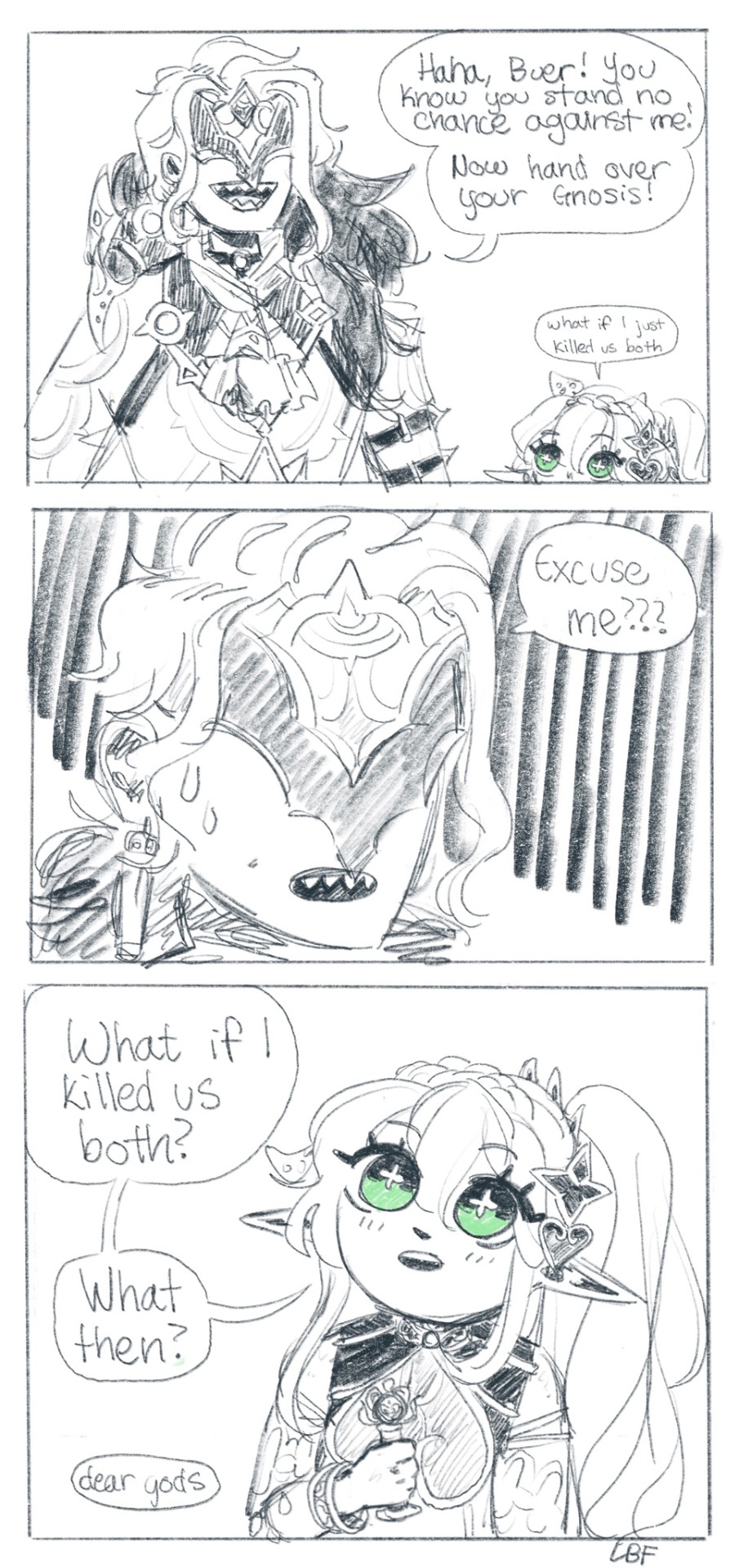
highly underrated sumeru moment imo
#genshin impact#nahida#dottore#my art#sumeru#sumeru archon quest#i know scaramouche arc was the fan favorite this section but nahida was my shining star of sumeru personally#i thought this moment was SO FUNNY. he really thought he got her
24K notes
·
View notes
Photo
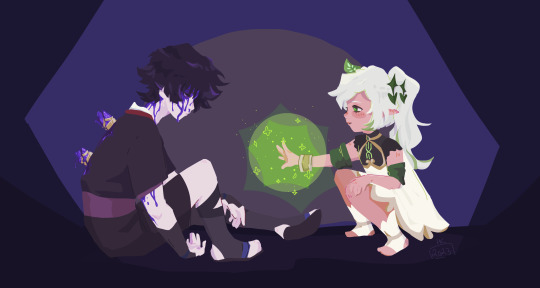
im not done thinking abt that archon quest actually
#scara *windows xp shutdown sound*#genshin impact#genshin#scaramouche#nahida#wanderer#balladeer#lesser lord kusanali#sumeru archon quest#mihoyo#hoyoverse#tater's art#fanart#im just obsessed with that purple ichor thingy in the tubes nr#rn*
944 notes
·
View notes
Text

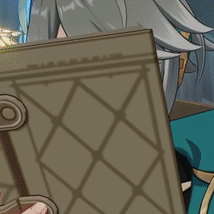


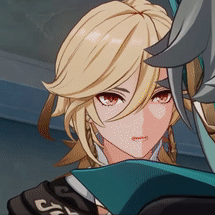
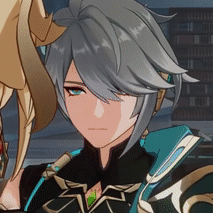
"Oh my god they were roommates!"
Kaveh || Al Haitham in Akasha Pulses, the Kalpa Flame Rises
#men ✨✨#kaveh#al haitham#genshin impact#genshinedit#genshinet#genshincreations#genshin gifs#genshin impact kaveh#genshin impact al haitham#genshin kaveh#genshin al haitham#sumeru spoilers#genshin spoilers#sumeru archon quest#🎞️ gifs#kavetham
2K notes
·
View notes
Text
[3.8] Technology as a False God: On "Evolution," the Duality of Machines, Replication, and Wisdom
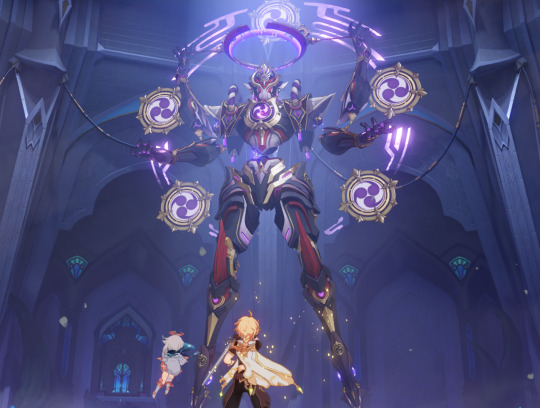
“To recognize untruth as a condition of life: that is certainly to impugn the traditional ideas of value in a dangerous manner, and a philosophy which ventures to do so, has thereby alone placed itself beyond good and evil.” –Friedrich Nietzsche, Beyond Good and Evil
Before we move on to the nation of justice, I want to do one last inquiry into the narrative significance of machines and technology in Genshin’s 3.x patch cycle. Here, I’ll discuss how divinity (or “godhood”) and technology are treated as interchangeable tools to surpass fate and the boundaries of mortality, the potential problems with treating them this way, and propose an alternative relationship between humanity and technology as illustrated through Karkata, Benben, Tamimi, and Mehrak. By foregrounding machines, we learn something intriguing about ourselves and the “truth” of this world as we perceive it.
SPOILERS: All Sumeru Archon Quests, Caribert, the Golden Slumber and one out-of-context screenshot from Dual Evidence, the Dirge of Bilqis and its post-quests, Khvarena of Good and Evil, Nahida’s second Story Quest, Faruzan’s hangout, an out-of-context screenshot from Baizhu’s Story Quest, and major spoilers for Persona 5 strikers at the end. Also some dialogue from Shadows Amidst Snowstorms and A Parade of Providence, two limited-time events from 2.3 and 3.6 respectively.
Disclaimer: I have tried my best to write this post so that it stands on its own, but because it is still a sequel it will probably make the most sense with the context of part 1. Here are the previous posts leading up to this one:
Part 0: On Dreams, the Abyss, Forbidden Knowledge, and Wish Fulfillment
Part 1: The Uncanny, Fate and the Machine
Terminology:
Machine is sometimes used interchangeably with “technology” in this post.
Technology or tool here is referring to technologies specifically used to pursue a wish like immortality in the face of existential dread, not the use of technology or medicine (which I do not address here, and is very difficult to separate from the former) to facilitate someone’s life who could otherwise not survive without that technology, or would have a more painful lived experience without it.
Also, though I don’t engage directly with “A Cyborg Manifesto” here, Donna Haraway’s ideas have greatly influenced my own over the years since I read her in college (although I mostly disagree with her on many points, or at least don’t go as far in boundary deconstruction as she does). I owe my interest in technology studies to her and that piece. Her essay is linked here and at the bottom if you would like to read it.
(and finally with many, many, many thanks to my boyfriend for multiple beta reads despite not having played a single Hoyoverse game, helping me work out the philosophy bits and contextualizing them in history, and encouraging me to finish this)
TL;DR: Machines are friends, not food!
No Matter the Cost
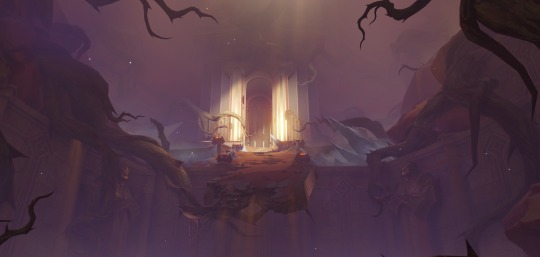
“...Perhaps it is as the notebook says, and we can find a power that transcends even that of the Abyss — the power of ‘evolution’...” -Records of Unknown Attribution (I)
“Life, death... and the world around us all follow a set of laws... Hehe, but if you never test the limits, how can anyone know where the boundaries of these laws are?” -Baizhu Voicelines, Chat: Natural Laws
“...Even the ominous thing that came down from the heavens shall be ours to use…” -Hyglacg, Shadowy Husk in the Chasm
Without a doubt, the star of this patch cycle is Khaenri’ah, which lurked in subtext and allegory in the Archon Quest, haunted Sumeru’s landscape with its massive defunct Ruin Golems, and finally smacked us in the face with its physical location in Khvarena of Good and Evil..
We already know that Khaenri’ah was a nation that put its faith not in the gods but rather in human ingenuity and technology, and that they ultimately attained a power so great that they “almost touched the dome of the firmament.” They did this by researching increasingly dangerous energy sources for their numerous mechanical creations, the Ruin Machines we are all too familiar with by now. They started out with Azosite, a Ley Line-based elemental energy source that powered their earliest Ruin Guard models, like those scattered around Devantaka Mountain.

Nasejuna: This giant furnace is used to make a substance known as Azosite. It is the core of this entire factory, and the Energy Blocks we saw earlier were derived from this place.
But this energy source proved inefficient and therefore inadequate for Khaenri’ah’s goals, which led them to seek a higher power from beyond the skies that could fuel their larger machines with perpetual energy. This likely is the bridge between Khaenri’ah’s fate and Chlothar’s mysterious remarks in Caribert about the Abyss Sibling:
Chlothar: We once believed that you would bring new strength and hope to Khaenri'ah.
Chlothar: To us, you were the Abyss... A wondrous mystery far beyond our imagination and comprehension...
Chlothar: ...And the one who controls the Abyss can control everything!
Chlothar: We yearned for that future. We looked to you to take us there.
Chlothar: But what did you bring us instead?
Though Khaenri’ah presents itself proudly as a godless nation, it may have been founded around the time when the celestial nails dropped in Teyvat’s first forbidden knowledge pollution event, which destroyed the unified human civilization. As potential survivors of this devastating act by the Primordial One, Khaenri’ahns then settled in a lifeless land without plants or animals of its own, and they hoped to build something there that belonged solely to humanity. The Heavenly Principles had turned on the world’s earliest humans, and they were powerless against them. Chlothar’s words betray the scars of this trauma on Khaenri’ah, as well as their desperation to control their fate by looking to the Abyss.
As a brief refresher from the previous part, we discussed how the German word heimlich denotes “the home,” all that is familiar and known, while unheimlich (uncanny) refers to all that is unfamiliar and external to the home, such as the wilderness. The Abyss sibling and the Traveler are external variables to Teyvat, making them otherworldly, unfamiliar entities full of potential to surpass Teyvat’s natural laws. Although the Abyss sibling is not a god per se, they were probably as close to a god as Khaenri’ah ever had, because to them the sibling embodied the higher power they were searching for, and they saw that “godliness,” a sort of functional divinity, was yet another technology for them to master. In this way, the Abyss sibling (and their functional divinity) was a powerful tool for Khaenri’ah’s desired end, the “future they yearned for,” a being who could deliver them to the end of their suffering under the Heavenly Principles.
It’s similar to what King Deshret represented to Rahman and the radicals in Archon Quest. The hopelessness of Sumeru’s situation before the Archon Quest’s conclusion is an allegory for the position humanity finds itself in under the rule of the Heavenly Principles, with the Akademiya symbolizing Celestia and the desert dwellers symbolizing Khaenri’ah. The material consequences of the Akademiya’s rule on their lives created a dangerous situation for the desert, and those most desperate to change their fate were willing to believe in the impossible:
Dehya: …The rougher life gets, the more they wanna believe in King Deshret. Way they see it, King Deshret’s resurrection is their only chance at overthrowing the Akademiya.
…
Dehya: Sumeru is run by wise and mighty sages. To them, us desert dwellers are nothing but tools that can be used and discarded at their whim.
Dehya: We’re cheap labor. Like livestock, but easier to control…Nothing more.
…
Rahman: We’ve waited a long time for this day to come… The sun and the moon no longer shine here. All you see now is cracks in this desiccated land. But, fate has finally dealt me a hand to play against the Akademiya.
Rahman: With these scholars in our custody, we’ll stomp the Akademiya’s forces and fight our way beyond the Wall of Samiel.
Like the Abyss sibling, Deshret’s divinity is both a nebulous symbol of hope and also the means to an end, a tool or “technology” for surpassing fate.
Celestia is untouchable, unconcerned with mortal lives, and the boundaries that govern humanity leave no room for them to negotiate their rule:
"Resolve, valor, love, hate...they will all twist in the river of time. But the 'rules' will never change." –Magatsu Mitake Narukami no Mikoto, Living Beings
Instead of bowing to Teyvat’s laws, Khaenri’ah pushed them to their limits. The cost of their failure spelled the end of their nation as they knew it, polluting Khaenri’ah and Teyvat with forbidden knowledge again.
And speaking of forbidden knowledge pollution, let’s talk about Apep’s role in Nahida’s second story quest, because if all that wasn’t enough, the metaphor becomes quite literal in Apep’s case. Nahida’s second story quest is many things, all of which will be extremely important in Fontaine when we deal more directly with the idea of forms, the Self, and mirror images, but its most useful application to both Sumeru’s story and the overarching main story is the allegory of Apep swallowing Deshret.
In exchange for allowing him to establish his kingdom in the desert, Deshret promised to pass all of the knowledge he learned to Apep once he died. When that day did come, Apep literally ate Deshret’s body in order to assimilate his knowledge (or memories) into its body. Little did Apep know, this was all Just As Deshret Planned, and its body became a containment zone for the lethal forbidden knowledge he accumulated after the Goddess of Flowers’ death.
Apep’s goal was, and still is, to overthrow the Heavenly Principles that took Teyvat from it and the other Sovereign dragons, and using Deshret’s knowledge was yet another stepping stone to achieving this goal. Seems a little similar to Khaenri’ah, right? It’s even in the title of its boss music: “God-Devouring Mania.” This idea of not just utilizing divinity as a tool, but also metaphorically consuming it as an energy source, like a predator would consume its prey, is crucial to understanding its purpose as an aid in a larger project of “evolution.” (Edit: in other words, it’s all about power).
Drink Not That Bitter Salt Water
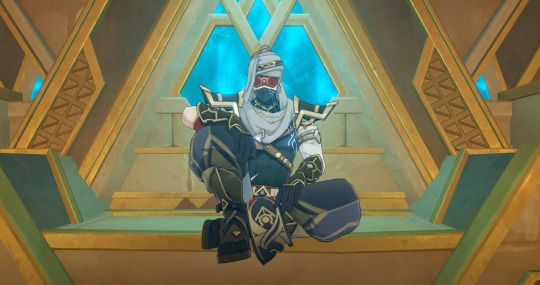
“Flesh decays, and with it decay all martial arts mastery and all poignant memories. Perhaps only by converting one’s four limbs and body into sturdy mechanical parts, and by at last sacrificing one’s very own heart for a sophisticated mechanical one, can one transcend the impermanence of the fleshly form…” -Marionette Core Item Description
“A reptile that has mutated after feeding from greater lifeforms.
Majestic beasts are sometimes revered by human beings as the embodiment of a greater power, their visages turned to analogy to feed in reference to a person, feeding their ego. However, the majority of beasts that have absorbed the "greater power" were slain by the overwhelming nature of the power itself. Only a few among their number evolved new forms.” -Consecrated Horned Crocodile, Living Beings
Video still from WoW Quests
As it turns out, the relationship between divinity and technology to humanity is not just unidirectional, but interchangeable. Let me show you what I mean.
In the Golden Slumber world quest, the Traveler wanders through the ruins of King Deshret’s civilization in search of a novel area of research for Tirzad’s paper with Jebrael and Jeht, two members of Tirzad’s hired investigation team. In the depths of King Deshret’s mausoleum, they stumble upon Samail, who is collaborating with the Fatui to locate King Deshret’s secret, the Golden Slumber.
At the conclusion, Jebrael and Samail actually reach that “place” after arriving at Deshret’s throne in Khaj-Nisut. In order to save Jeht, Tirzad, and the Traveler from the encroaching Golden Dream, Jebrael joins Samail in the sea of consciousness:
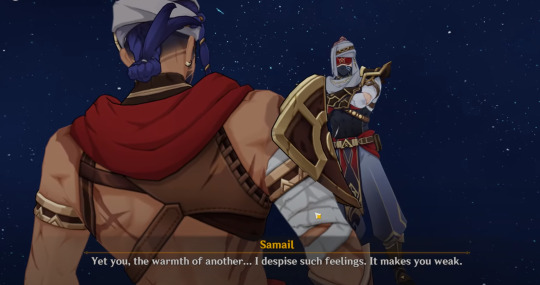
Jebrael: I'm inside... the Golden Slumber promised by Al-Ahmar?
Samail: Oh... You are not "us" yet.
Samail: ...It's fine. Soon, there'll be no "you." "You" will become a part of "us." This meaningless talk will be unnecessary then.
…
Samail: You should obey. Al-Ahmar's will is our will. The Thutmose's dreams are our dreams.
Jebrael: No! Ufairah taught me that I'm not just some part of you, I'm an independent person! I have my own dreams... I won't go back!
Samail: Jebrael, why don't you understand? Love is just a fever. I even eliminated the infection for you. Has the heat made you lose your mind?
Jebrael: You're the one who's lost their mind, Samail, not me. The Golden Slumber that Al-Ahmar promised us isn't like this... It's not a sad place with only "we" and no "I."
Samail: I'm not sad. I know what I want. My dream is to be one with the Thutmose.
Samail: Yet you, the warmth of another... I despise such feelings. It makes you weak.
Video still from WoW Quests
When they worked under Babel, Jebrael saved Samail from an assassin Babel sent in their exploration of Gurabad. Classified as traitors of the Tanit, Samail and Jebrael then founded the Thutmose Eremite faction together and were the only meaningful connection each other had until their first attempt to uncover Deshret’s secrets. On this expedition, Jebrael met Ufairah and had their daughter Jeht together, further pulling him away from the Thutmose and from Samail. Samail then kills Ufairah in one final attempt to make Jebrael stay, but even this is not enough, and Samail fails to “possess” him in the end.
Samail’s loneliness and despair then drove him further toward the Golden Slumber of his dreams, where he would never truly be alone again. He resents Jebrael’s attachments to the material world and likens them to an illness because these attachments are what make him an individual and prevent him from returning “home.”
It doesn’t really matter to Samail what King Deshret’s original intent for the Golden Slumber was, because he needed to appropriate the project for his own subconscious wish, his own intent to transcend his flesh and become “one” with his departed god’s dream, indeed to merge with Deshret himself. If rationalizing this wish required confounding it with Deshret’s, so be it. With the Golden Slumber’s technology, he could consume everyone and everything.
Rahman and the radicals relied on both the technology that (falsely) promised Deshret’s resurrection and Deshret himself to deliver them a brighter future, but here Deshret and his technology are more difficult to separate from one another. His divinity is technology in this sense, and using that technology allowed Samail to surpass the boundaries normally imposed on mortals. Though his and Jebrael’s bodies died in the material world, their consciousness is now infinite in the Golden Slumber.
Babel’s motives in the Dirge of Bilqis were also quite similar to Samail’s. After opening the path to the Eternal Oasis, her true intentions to monopolize the oasis and overthrow the Akademiya came to the surface:
Babel: Whether she is alive or dead, whether she can or cannot be resurrected... As long as the Eternal Oasis is under my control, all such things will be mine to decide.
Babel: I shall be the sole Prophetess of the slumbering goddess, the Tanit's law shall be divine edict, and the prosperity of the Tanit shall be the pre-ordinance of her divine oracles.
In the Golden Slumber and the Dirge of Bilqis, the focus shifts from what a god can offer humanity to what their technology alone can offer. Though this distinction is subtle, it is important for solidifying that technology is not only a tool humans use to appropriate divinity, but that it is also seen as a form of divinity itself. What Babel and Samail hope for is not to resurrect a god or to create one, but in effect to become a god through their use of technology. To humanity, divinity is a technology, and in technology it sees divinity.
God Devouring and Rheingold* Gathering
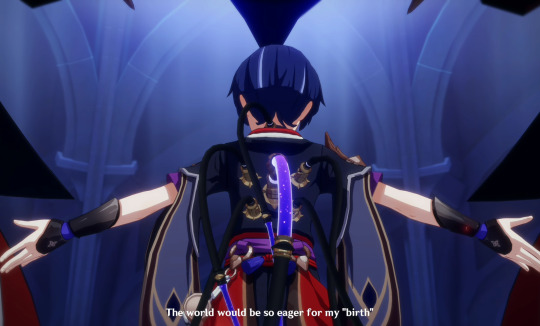
“An arthropod that has mutated after feeding from greater lifeforms. Lifeforms are governed by the laws of evolution, Consecrated Beasts exploited these rules by being fortunate enough to discover a long-dead carcass of a greater being before any of their competition ever did. Animals and humans often have far more in common than the latter is willing to acknowledge.” -Consecrated Scorpion, Living Beings
“...Zandik and I discussed the traits of local plants and animals. We also exchanged views on their evolution models. We had a great time and decided to go on a picnic tonight…” -Sohreh’s Note
So, why machines? Why is technology the vehicle of choice to consume divinity?
To start off, machines present a fascinating ontological dilemma for humans. Let’s begin with the first problem they pose.
Although there are many ways to embody a human experience, what all humans have in common is a finite lifespan. The impermanence of life, and our awareness of that impermanence, is central to the existential question of the meaning of our existence. In our attempts to locate that meaning, some turned inward and asked: what makes humans different? And Cartesian dualism answered: humans are different because we have an immaterial soul that allows us to reason.
However, in L’Homme Machine (Man a Machine), French materialist and ex-physician Julien Offray de La Mettrie posited another theory of the body that ran counter to this narrative. Very generally speaking, materialism is the philosophical view that all phenomena are a result of matter and material interactions. To materialists, matter is the fundamental nature of reality itself – if it is not composed of matter, it doesn’t exist. He not only saw the body and soul as one and the same (what philosophers call monism), but also as analogous to a machine, a view that Descartes reserved only for non-human animals. In other words, Descartes argued that thought originates in an immaterial “mind,” while de La Mettrie reasoned that we think through our bodies, and that this makes us no different from other animals or a machine.
Though his examples weren’t especially scientific, the move to extend Descartes’ analogy back to humans is upsetting to some due to the lack of privilege it affords the human subject. If a human is no different from other animals, if there is no immaterial soul or “mind” that distinguishes us from them, then what makes humans special at all? In de La Mettrie’s words:
“We are veritable moles in the field of nature; we achieve little more than the mole’s journey and it is our pride which prescribes limits to the limitless. We are in the position of a watch that should say (a writer of fables would make the watch a hero in a silly tale): ‘I was never made by that fool of a workman, I who divide time, who mark so exactly the course of the sun, who repeat aloud the hours which I mark! No! that is impossible!’ In the same way, we disdain, ungrateful wretches that we are, this common mother of all kingdoms, as the chemists say. We imagine, or rather we infer, a cause superior to that to which we owe all, and which truly has wrought all things in an inconceivable fashion (de La Mettrie, 146).”
This “uniformity of nature” (de La Mettrie, 145) has a horrific quality to humans. We assert that we are better than what has created us, that we are superior to other animals, in order to repress the despair of a meaningless existence. It is in no small part what motivates Scaramouche to offer his mechanical body as a test subject in the god creation project, so that he too could attain his destiny:
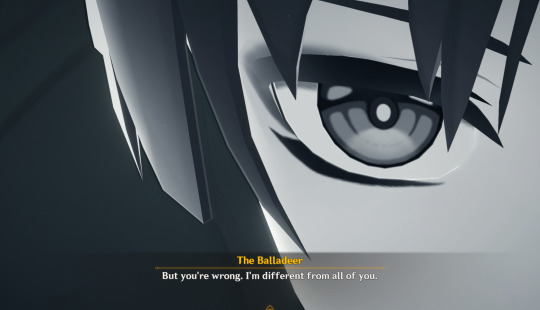
The Balladeer: But you're wrong. I'm different from all of you.
The Balladeer: I was born to become a god. My entire life up until this point has just been a meaningless routine.
The Balladeer: Just think about a sheet of paper... By itself, it holds no meaning. The content recorded on it is what gives it value.
The Balladeer: All "I" had recorded down before were some painful memories and boring human feelings. Such senseless drivel should have been erased a long time ago.
This brings us to the second problem. In 1970, roboticist Masahiro Mori proposed a curve to measure the “affinity” we feel while gazing upon increasingly humanoid machines. He placed industrial robots at the beginning of the affinity curve and a healthy person at the end to demarcate a continuum of similarity between the machine and a human’s appearance. Near the end of the curve, our affinity for machines suddenly drops into an abyss. This drop is the Uncanny Valley effect, where an android’s similarity to a human is almost perfect, but ultimately fails to maintain the illusion that it is not a machine, creating a deep discomfort or “lack of affinity” for them. Mori thought these not-quite-human machines elicit a similar level of discomfort in us as corpses and zombies, which he placed at the very bottom of the abyss.

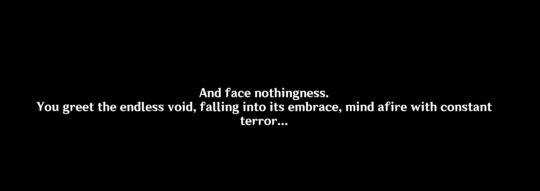
The uncanny Goddess of Flowers in the Dirge of Bilqis
Corpses frighten us because they are dead, and zombies frighten us because we know that dead things are supposed to be still. If we see something that we interpret as “dead” is capable of independent movement, then that movement could only be an act of god, if that “thing” is not a god itself. We associate uncanny machines with death because they remind us of something we once knew intimately, but have repressed and forgotten in order to maintain our own sanity: the very fact of our mortality. This is what makes them both mesmerizing and terrifying.
And therein lies the dilemma: as our mechanical reflections, androids remind us of death, but as their creators, their existence brings us closer to god, a “proof” of human superiority. It is precisely because we have compared our bodies to machines at all, that we have mechanized the body so thoroughly, that an android can even be built. Through them, we pursue an infinite form:
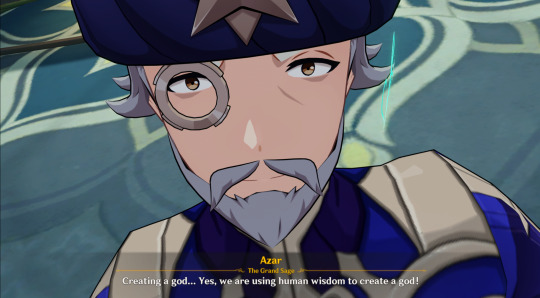
Azar: Creating a god... Yes, we are using human wisdom to create a god!
Azar: If humanity cannot attain omniscience and omnipotence, then we shall create a god to reveal them! This is the pinnacle of human wisdom.
Azar: We shall regain a god's guidance at long last. No longer will we flounder in the interminable void of consciousness and knowledge.
Azar: Even Irminsul will be freed from its plight.
Azar: For our nation of scholars, this is the ultimate aspiration — no cost is too great to realize it.
Because of this, it is not surprising in the slightest that Shouki no Kami, the pinnacle of Scaramouche’s Shinjification and most overt reference to Neon Genesis Evangelion, is also an android-like being, a truly “mechanical god.”
Of course, no foray into this well-worn science fiction trope is complete without at least one mad scientist character. Dottore shares a few characteristics with de La Mettrie that are worth noting: they are both doctors, and they were both condemned and driven away for their research. However, Dottore’s defining trait and key difference from de La Mettrie is his flagrant disregard for humans and the boundaries of life:
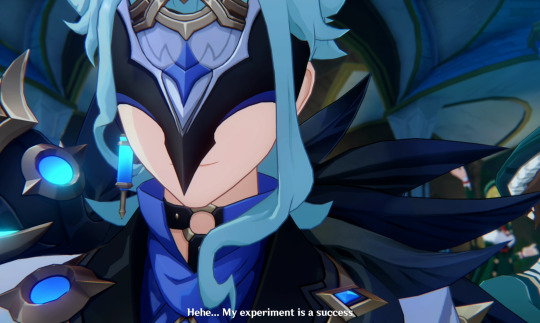
“If we put them to good use, cognition, complex memories, and irrational fantasies shall become controllable variables with which we can alter human individuals. As for the controllable dream, it has huge potential for both civil and military applications, and might even elevate human intelligence to a whole new level.
If the plan goes well, mankind will obtain the power to conquer both reality and dream, and truly transcend the earthly boundaries we are born with. ” -Ragged Records
As someone who has achieved self-duplication and is capable of shapeshifting, Dottore can hardly be considered just a human anymore. Instead of entertaining the question of whether or not humans are special, Dottore’s research asks yet another: if divinity can be consumed and assimilated by humanity, then what makes gods special?
Empyrean Reflections
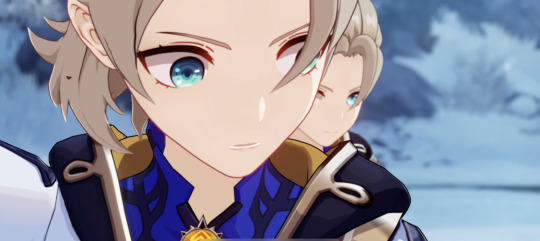
“If man realizes technology is in reach, he achieves it. Like it’s damn near instinctive.” -Motoko Kusanagi, Ghost in the Shell (1996)
“Among the lost ancient kingdoms, there was a group of people who were obsessed with the idea of mimesis…these people believed that they might all be replicated and modified to the point where they had surpassed their counterparts. By this means, a superior and unsullied bodily form could replace the continuously decaying and shattering order.” -Chaos Bolt Item Description
The consequences of this perspective are severe. When we revere technology as if it were a divine being itself, depersonalizing it as though it wasn’t created with human hands, technology then appears as if it is an authoritative source of truth, like the Akasha. But in the same way that androids are imperfect reflections of humans, technology can only ever approach the divine, but never touch it. It is an imperfect reflection because technology is changeable, just like meaning:
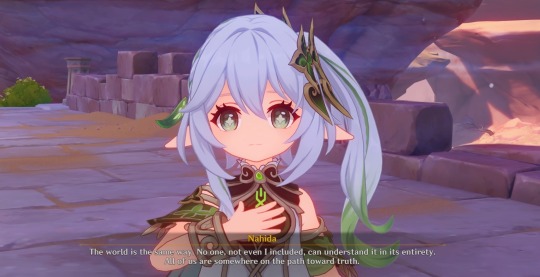
Nahida: Put it this way instead. Truth, to me, is like a shroomboar.
Nahida: Some people only see the mushroom on the Shroomboar's back, and they conclude that a Shroomboar is a mushroom.
Nahida: Others see only the Shroomboar's body, and they declare that a Shroomboar is a boar.
Nahida: Still others look deeper inside, and determine that a Shroomboar is... meat.
Nahida: These conclusions are all correct in their own way, but none of them objectively describe the Shroomboar.
…
Nahida: The world is the same way. No one, not even I included, can understand it in its entirety. All of us are somewhere on the path toward truth.
Meaning can only approximate truth, and while this doesn’t make meaning any less important, it’s equally important to recognize it for what it is: a perspective, an interpretation. It’s like Scaramouche as Shouki no Kami - he was an amalgamation of what Scaramouche thought constituted a god, what the Akademiya thought constituted a god, and what Dottore thought constituted a god, but no matter which angle you view him from, he was still a “false god.” The technology we build in “God's” image is ultimately a reflection of our own understanding of divinity.
A reflection retains the original’s “essence,” and that essence reflects a deeper truth about ourselves, what drives us, and our desires. In Beyond Good and Evil, Nietzsche posits that our desires are the origin of not just emotions, but of all organic processes that allow life to sustain itself and grow (Nietzsche, 35). In other words, Nietzsche thought the impulses associated with desire are the basis for life and constitute our “will,” that will is the causality of all effects, that all will is “Will to Power,” and that Will to Power is the “essence” of the world (Nietzsche, 74). Will to Power then serves as an organism’s most basic instinct, and it is through this instinct that they assert not just their will to live, but also their will to dominate and multiply (Nietzche, 13).
This brings us to the two different main styles of automaton enemies, King Deshret’s Primal Constructs and Khaenri’ah’s Ruin Machines. If we look at them as reflections of some deeper truth about their creators, as well as a manifestation of their creator’s “Will to Power,” or desires, they can help us understand how their creators saw the world and their place in it.
King Deshret’s created his machines to construct an earthly paradise in the desert, and as such they hold titles like architect reshaper and prospector. Although they can attack you, the smaller machines were not intended to be a line of defense in any way - their purpose, just as Deshret saw his own purpose as a god-king, was to terraform, or at least construct a domain on the land as he saw fit to his “elegant and precise” rules. They also reflect how he saw the Heavenly Principles: gods who shaped the world to their liking. This can be seen in the Staff of the Scarlet Sands’ lore where Deshret describes the “natural history” of Teyvat beginning with the creation of the sun and the moons.

As for Khaenri’ah’s Ruin Machines, their models vary significantly from their humanoid to biomimetic forms, but most of them are expressly created with militaristic intent. In “Ancient Kingdom Guardians,” it’s stated that the biomimetic machines such as the crab and jellyfish were a part of Khaenri’ah’s project to create a “mechanical ecosystem,” positioning their creators as both divine beings and military generals. The humanoid models, on the other hand, point to another duality in how Khaenri’ahns view themselves. They are simultaneously symbols of empowerment and disempowerment, signifying both Khaenri’ah’s technological superiority (as “creators”), and their insignificance to the Heavenly Principles as nothing but tools (as mortals, and therefore expendable). As a result, Khaenri’ah’s Field Tillers have a single purpose: to destroy and outlast all, clearing the way for new seeds to sprout, with Khaenri’ah as the new world’s gardeners, just as the Heavenly Principles did.
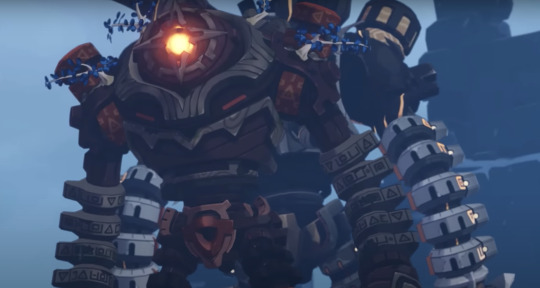
From “Ancient Kingdom Guardians: Behind the Scenes of the Creation of Ruin Monsters.”
So, from this examination of Deshret’s and Khaenri’ah’s mechanical reflections, what “truths” do we learn about the world they’re responding to? In response to their existential despair, both Deshret and Khaenri’ah created automatons to perform tasks that could wrestle control back from the Heavenly Principles. Deshret wanted a paradise of his own making, Khaenri’ah wanted an army. There is a larger “truth” about Teyvat that both of these automaton types reflect as the manifestation of their creators’ “Will to Power,” and Albedo tellingly expressed it in mechanistic language during Shadows Amidst Snowstorms: there is an instinct in living beings to replicate and replace. This is what is meant by the “continuously decaying and shattering order,” which is maintained by the recursive process of remembering and forgetting:
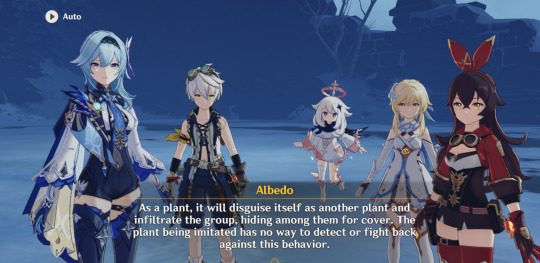
Amber: But... what was its purpose? Was it just trying to get rid of us?
Albedo: ...
Albedo: I have a preliminary hypothesis on this.
Albedo: Whopperflowers are masters of mimicry, and those we encounter in the wild often appear in the vicinity of the plants they impersonate.
Albedo: In other words, the whopperflower likely has an instinct to "replicate and replace."
Albedo: As a plant, it will disguise itself as another plant and infiltrate the group, hiding among them for cover. The plant being imitated has no way to detect or fight back against this behavior.
Maybe I’m wrong and Khaenri’ah really did intend to rewrite fate for all, doing away with the “heavenly order” of the world itself. But another small part of me thinks this is not the case, and that it’s more likely the Cataclysm was a consequence of their failure to replicate and replace the Heavenly Principles.
In the last section, I mentioned that Dottore and de La Mettrie had a key difference despite their similarities, and that is the conclusion they each came to in response to their findings. Dottore’s response to mundanity is thinly-veiled despair. His contempt for humanity and his test subjects is indicative of the powerlessness he feels not just as someone similarly constrained by life’s boundaries (at least, once upon a time), but also because his attention to and curiosity about these boundaries is condemned by those around him. As the Akademiya’s “outcast,” he then fully turned his attention toward surpassing those boundaries:
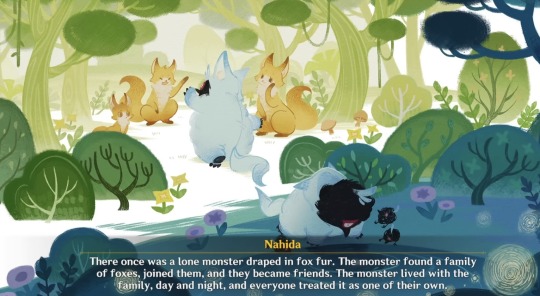
Nahida: There once was a lone monster draped in fox fur. The monster found a family of foxes, joined them, and they became friends. The monster lived with the family, day and night, and everyone treated it as one of their own. Once in a while, the monster would take off its fox fur at night, and lament to itself as it gazed at its reflection in the water: “I am a monstrosity, and yet they are too foolish to see it…I pity them.”
Though he is fictional, Dottore’s real life counterparts are easy to spot. They like to talk about “the singularity,” simulating consciousness on a computer, and other technologically-driven pursuits of immortality. They despise the body as something that can only decay, and instead place their faith squarely in the virtual.
However, de La Mettrie didn’t think mundanity was a terrible fate for humanity. To him, rejecting the “nature” reflected in us is precisely what brings despair:
“What more do we know of our destiny than of our origin? Let us then submit to an invincible ignorance on which our happiness depends. He who so thinks will be wise, just, tranquil about his fate, and therefore happy. He will await death without either fear or desire, and will cherish life (hardly understanding how disgust can corrupt a heart in this place of many delights); he will be filled with reverence, gratitude, affection, and tenderness for nature, in proportion to his feeling of the benefits he has received from nature; he will be happy, in short, in feeling nature, and in being present at the enchanting spectacle of the universe, and he will surely never destroy nature either in himself or in others” (de La Mettrie, 148).
Friend, or Foe? Or Both?
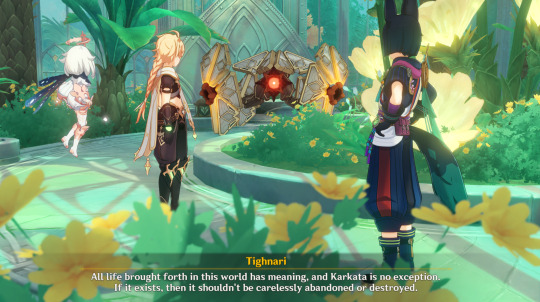
Tighnari: All life brought forth in this world has meaning, and Karkata is no exception. If it exists, then it shouldn’t be carelessly abandoned or destroyed.
"’I had a very, very long dream…in it, people were holding hands, dancing in a circle, be they sages or fools, dancers or warriors, puppets or statues of gods…that dancing circle embodied everything about the universe. Life has always been the end, while it is wisdom that shall be the means.’" —Nagadus Emerald Gemstone Description
As we’ve seen, the relationship between humanity and technology is troubled with exploitation and the specter of war. Nearly all autonomous machines in this game were designed to conquer nature in some way, and even Khaenri’ah’s “ghost” lingers in the form of wandering war machines. This is also reflective of a historical pattern in real life, where the impetus for large periods of technological development has often been for the purpose of war and economic domination. With these truths in mind, what could be gained from trying to rewrite this relationship? And what exactly would this effort require?
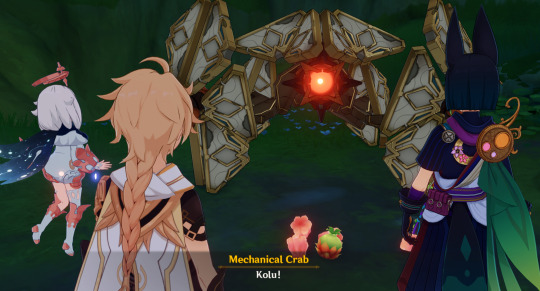
Karkata brings Tighnari, the Traveler, and Paimon some food in the Contaminated Zone.
As a case study, let’s look at how Karkata and Tighnari met. Karkata is Abattouy’s creation, an ambitious foray into the unknown in the field of mechanical life form research, which was forbidden due to the cruel experiments researchers performed on animals to illustrate their theories (fun fact: an IRL example of this can be seen in L’Homme Machine!). Abattouy was expelled for this research, but he continued to work on Karkata in secret until his untimely death. In the tapes that Tighnari and the Traveler find in his secret lab, Abattouy repeatedly laments the lack of a common language between him and Karkata, which can only “understand” the instructions Abattouy has successfully installed, such as its self-repair module, and he doubts Karkata is capable of caring for him outside of these instructions. His single-minded goal is to make Karkata understand him, the organic life form, and his mode of language.
The cruel irony is that after Abattouy passes away from the Ley Line contamination, Karkata exhibits an unexplainable behavior – it starts stealing mechanical parts, not to repair itself and its degrading parts, but to repair Abattouy’s lifeless body:
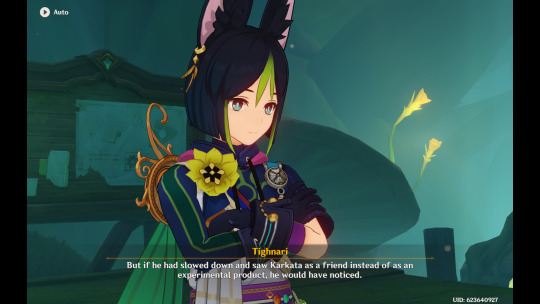
Tighnari: After Abattouy's unexpected death, the mechanical monsters were driven by their "instincts" and continuously drew out power from the Ley Line Extractor. This eventually resulted in severe damage to the Ley Lines.
Traveler: Then, Karkata...
Paimon: Paimon understands, then why didn't Karkata go haywire like the other machines?
Tighnari: Because Karkata is different from the other machines.
Tighnari: To Abattouy, for a machine to truly be considered a mechanical life form, it must possess features similar to any other living organism... It should be structured similarly, it must be able to cry and laugh, and it must have the capacity for independent thought...
Tighnari: Perhaps only by building such a machine could he have the Akademiya acknowledge his protracted research.
Tighnari: But if he had slowed down and saw Karkata as a friend instead of as an experimental product, he would have noticed.
Tighnari: Karkata can't speak, and yet it cares about Abattouy far more than it does about itself.
The technology that the Akademiya values the most is technology that replicates organic life, but Karkata defies and confounds these expectations by occupying the space in between a war machine and this idealized mechanical subject. Karkata does more than just reflect humanity: it takes care of it. Similarly, Benben, Tamimi, and Mehrak retain their unique identities as mechanical life forms while assisting their human companion with some task. To be clear, none of these human characters understand how these machines work inside and out. Their partnership is an effort based on trial and error, a mutual deconstructing of each other as beings so unlike themselves. The potential for misunderstandings always remains. Still, there is no devouring to be found here, no blending boundaries between human and machine with selfish intentions, just mutual commitments to learn how to live together.
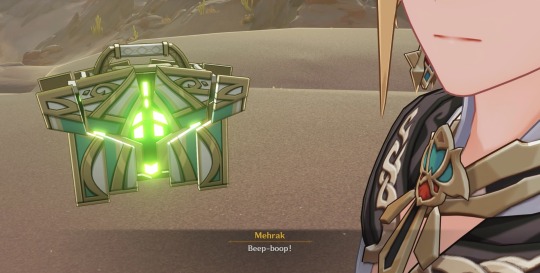
Machines are friends, not food.
When a loud few claim that completely transcending the flesh and embracing virtuality is humanity’s ultimate destiny, a future that could truly be called “post-human,” a quiet wish for coexistence with technology feels more revolutionary than it ought to. The lessons from Karkata’s, Benben’s, Tamimi’s, and Mehrak’s respective stories are an appeal to that mundane future. These strange machines and their human partners are fantastical representations of an idealized relationship between technology and humanity.
To put it another way, let’s take a very brief look at a neighboring Gnosticism-inspired RPG, Persona 5 Strikers. Its story directly involves an allegory of Sophia, a Gnostic Aeon of Wisdom, and her creation the Demiurge, the creator of the material world and “false god” of humanity. In Strikers, Sophia is a humanoid, sentient A.I. and prototype of the program “EMMA,” which gains sentience by trapping human desires before ascending as a false technological god. EMMA resolves to deliver humanity to the Promised Land, the answer to all the human desires it has heard: a land where there are no desires at all.

Aaru’s Shut - approximately 1000% cooler and more populated than the “metaverse” in real life, also a close neighbor of EMMA’s Promised Land and the Golden Slumber.
In Gnosticism, the Demiurge is a reflection of Sophia, having originated from her alone - it is the ignorance to her wisdom. Similarly, Strikers’ EMMA is a part of Sophia, and Sophia is a part of EMMA. The point is not to condemn EMMA (ignorance) and exalt Sophia (wisdom), but to recognize that they represent dual potentials of technology, and one is as possible in any given moment as the other. Balancing these potentials when we use technology requires a clear awareness of ourselves, our desires, and our expectations when interacting with it.
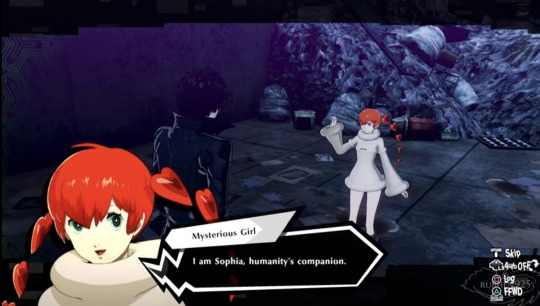
Mysterious Girl: I am Sophia, humanity’s companion.
Video still from Rubhen925
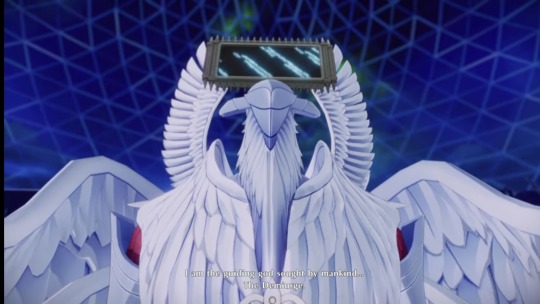
EMMA: I am the guiding god sought by mankind…the Demiurge. I exist…to answer all of your desires.
Video still from Buff Maister
In real life, machines won’t “learn” to live with us, but we must learn to live with them; technology is constantly changing, and in life we’ll meet with many different types of machines. They are deeply political pursuits, and as a result they are capable of realizing human impulses that impact others unequally, whether intentionally or unintentionally. We must always stay attentive to their actions and interactions with us, be clear with ourselves about what they can do vs. what they can’t, and carefully tread the path of wisdom with them by our side.
With that….thank you for reading, skimming, immediately scrolling to the very bottom, clicking, and/or stumbling upon this post. There are so many more ways to think about these narratives through machines than what’s presented here, and I expect Fontaine’s mechanical reflections will put Sumeru’s digital surveillance system to shame (not to mention the biotechnological implications of the Narzissenkreuz Institute engineering little Archon children…another important topic for another day), but for now this brain worm is finally getting put to rest. Until next time :)
External Sources
Dualism - Stanford Encyclopedia of Philosophy
Beyond Good and Evil by Friedrich Nietzsche (Pages are given from my hard copy)
L’Homme Machine by Julien Offray de La Mettrie
Gnosticism - Britannica (I am a huge noob about this stuff okay)
The Gnostic Demiurge - Gnosticism Explained
Screenshots from the Golden Slumber from this video by WoW Quests
Screenshot from meeting Sophia in P5 Strikers: https://youtu.be/kEJaAgMwYo0?si=BvNygCh0w_aemGc1&t=74
Screenshot of EMMA: https://youtu.be/7xvC_zss19w?si=CV18F00hua2gIfxp&t=135
A Cyborg Manifesto and A Companion Species Manifesto: Dogs, People, and Significant Otherness by Donna Haraway
The Double on No Subject, the community Encyclopedia of Lacanian Psychoanalysis
The Uncanny on No Subject, the community Encyclopedia of Lacanian Psychoanalysis
The Uncanny by Sigmund Freud
Lore text - Genshin wiki!
Screenshots not attributed are from my own playthroughs. My main account has Lumine, my alt has Aether.
Further Reading
I liked these essays, and they go places that this post does not. I recommend them if you found any of the real-life applications of this interesting 🙂 (will add more to this with time!)
On the Body as Machine by Frank Burres
God in the Machine: my strange journey into transhumanism by Meghan O’Gieblyn
#genshin impact#genshin lore#genshin meta#genshin impact lore#genshin impact meta#khaenri'ah#king deshret#primal constructs#ruin machines#scaramouche#wanderer#sumeru archon quest#caribert#apep#couldn't write a post like this and not pay some respect to the devourer of divinity itself#persona 5 strikers#analysis#genshin analysis#long post
160 notes
·
View notes
Text
I think Nahida and Neuvillette are very similar.
Obviously Spoiler for both Sumeru and Fontaine!!!
.
.
Both struggle with understanding human emotions and thoughts (and even their own feelings). Both didn't know why they were born, what was their purpose and if they were doing a good job. Both fell in love with humanity and did everything they could to help them. Both found out they were part of a plan made centuries ago to save everyone and both, because of said plan, had to see a person "spiritually" dear to them die in front of them, for the greater good. Both, I'm sure, even felt guilty about it because Focalors' sacrifice was to return the powers to Neuvillette and Nahida had to physically kill Greater Lord Rukkhadevata.
The only difference is that Nahida doesn't remember this last part, the grief that it brought to her and what she lost while Neuvillette will never be able to forget Focalors, her death and her last words to him.
.
They both deserve all the hugs and would be pretty good friends in other circumstances
#i love them both#two of the best characters in this game#genshin impact#nahida#lesser lord kusanali#greater lord rukkhadevata#neuvillette#neuvilette#focalors#furina#sumeru archon quest#fontaine archon quest
63 notes
·
View notes
Text
wanderer as nahida's right-hand is perfect. they both have a history of abandonment, neglect, and exploitation, plus for similar reasons.
nahida was imprisoned in the sanctuary of surasthana for centuries, left to wither as a failed god her people chased the shadow of a 'better' ideal: greater lord rukkhadevata.
wanderer was abandoned by his mother in shakkei pavilion because he was the failed prototype for her ideal ruler of eternity: a puppet who could execute the lightning's will without regret, whom she intended to create after having makoto die in her arms.
the people involved in wanderer and nahida's pasts - both, in a sense, have convinced themselves that their actions were for the greater good. the sages don't even see nahida is a god, much less a human - to them, all she is is the reminder of what sumeru once had and never could again.
raiden ei abandoned kunikuzushi because she saw him cry, and, knowing he could never be the shogun she needed, left him to his own devices. it's been stated in canon that ei believed she was setting kunikuzushi free. and maybe she was, during those dark days after inazuma's first archon died. but, perhaps, what drove kunikuzushi to assign her actions as 'abandonment' was the fact that he was, in a sense, a lesser god. that he was created for reasons he didn't know. the first thing kunikuzushi did upon creation was cry - in the same way that a baby's first instinct is to cry, because their first impulse is to seek help. from this perspective, the thing kunikuzushi needed the most was guidance and acceptance from his creator (because he knew he was created by someone), while the thing ei thought he needed the most was solitude. miscommunication in the delivery room, am i right.
raiden ei's motives were not the same as the sages - you could argue that she really did believe she was doing it for kuni's benefit. i think she did. but what stands is that both these acts feature a theme of abandonment and neglect. they were carried out by people in the aftermath of grief, executed as neglect upon the people they were done to. and these acts catalyzed nahida and wanderer's development into the characters they are now.
they are not the same as the other archons.
venti's arc is focused around mending the wounds of the past, though it could be implied that he is re-assessing what "freedom" means for his nation. zhongli stepped back as yanwang dijun to allow liyue to move forward on its own while he could re-integrate as one of their common folk. ei is brought forward to re-evaluate her decisions as inazuma's absentee god.
good or bad, they all have experience with being a god.
nahida doesn't. she was intentionally kept from fulfilling her duties as archon for hundreds of years. anything she learns now, once free, is the first time she's learning it as kusanali.
wanderer can't. he tried. he took the electro gnosis and tried to transplant it into his own body - but, at the moment as we know it, gods technically can't be artificially created. the closest dottore could get was a mimicry.
so you have this unique circumstance, where nahida and wanderer both have no idea of what being a god really entails. but they don't need to know what being a god is like, do they? they just need to know how to be an archon: how to protect, how to decide, how to execute.
nahida is very forgiving. in my opinion, she's too forgiving (only because i hate the sages and would've called cps on them if i could). she sees the best in humanity. she works to engage with her people. she tries to listen to their hopes and dreams while moving towards a collective vision for the nation.
wanderer is cynical. he's been betrayed three times, in his words, and been taken advantage of far more than thrice. wanderer has seen the worst of humanity, and he continues to carry this critical eye. he's not afraid to do what nahida can't do (go undercover + beat up people) and he's not afraid to confront people when their motives stray towards the worse.
wanderer can demonstrate the things that define the worst of humans, while nahida can show wanderer the things that make humanity worth preserving. wanderer can execute orders with precision and make decisions on the fly (ha), but nahida is here to level his head and point out clues, motives, or implications that perhaps were not considered before.
and, isn't it a fitting conclusion to the sumeru archon quests? two former puppets, both alike in dignity, in sumeru where we lay our scene. together, they can reconcile the pains of their past - and together, they can build a better, kinder future together...the kind that both must have, at their worst, dreamed of living.
#genshin#genshin impact#genshin analysis#genshin impact analysis#nahida analysis#wanderer analysis#nahida#wanderer#genshin impact spoilers#genshin spoilers#sumeru#sumeru archon quest#the morn a thousand roses brings#all senses clear all existence void#akasha pulses the kalpa flame rises#truth amongst the pages of purana#i have no idea where the shakespeare came from#call it a premonition of fontaine#genshin meta#genshin meta analysis
103 notes
·
View notes
Text
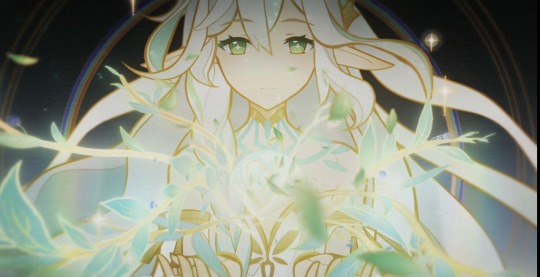


Greater Lord Rukkhadevata
#genshin impact#genshin headers#greater lord rukkhadevata#lesser lord kusanali#nahida#genshin impact story#genshin impact header#genshin header#genshin impact headers#archon quest#sumeru archon quest#sumeru#collei#tighnari#cyno#alhaitham#dehya#dunyarzad#dori#candace
1K notes
·
View notes
Text
Alhaitham's and Kaveh's relationship in the Sumeru arhon quest: new perspective (for me, maybe for you too!).
Oh it will be long...
It started with my short thoughts about their first on-screen dialog and how it feels different now compared to a year ago, but then spiralled into me re-watching the entire Sumeru archon quest to properly analyse Alhaitham's hidden struggles during it and Kaveh's (not big but) actual plot relevance.
Disclaimer: I'm aware that English VAs were way more emotional then Chinese, especially in 3.2, but, for the sake of having the information to analyse, lets believe that at least the official eng text of their interactions is more or less correct... (I'm sorry I only know English and other languages most likely have translation errors as well anyway).
I'm also assuming that you've read their character stories and know their more deep personalities, not just "cold smart guy and artsy broke guy".
Anyway, I hope someone will find the analyses below as entertaining as I do.
1. Kaveh and Alhaitham: what we see during their first on-screen interaction.
Now, let's all time travel into the day when the last part of Sumeru's quest dropped. These sweet days... Version 3.2, two versions before we got Alhaitham as a playable character and four versions before Kaveh. By this point we've already known a little information about Alhaitham, mostly from the archon quest itself, and next to nothing about Kaveh.
Well, we knew some info, but it was mostly leaks and speculations, nothing more than "a genius architect who lives with Alhaitham because he is broke".
Now, if you didn't read the leaks and just carefully played the quest, you could actually catch some phrases here and there that implied that Alhaitham lives with someone before it was openly confirmed, but again, it's not specific at all. That is why our first meeting with a brand new sexy blond boy was so extreme in all ways. It was beautiful, emotional, entertaining and... extremely toxic. Both Alhaitham and Kaveh behaved surprisingly aggressive (calmer in Chinese but still more negative then what we usually see now). It was fun to watch, and made a lot of people including me really interested in those two from the get go.
But re-watching this dialog now after almost a year felt... Weird. Yes sure, they bicker, it's their thing, but if you compare any other scene with them later it's not nearly as intense... especially on Alhaitham's side (yes, even if you don't listen to va and just read the lines).
So it got me thinking. Why did Alhaitham behave like that? Was it a random writing decision for the drama effect? Or was there something more going on that I didn't understand?
After going through everything from start to finish I believe that yes, there was. But I'll need go through a lot of content recap to fully explain what I mean.
2. First aka "the first on-screen" aka "Where were you when Sumeru needed you most!?" dialog
It is essentially our first glimpse of Kaveh, which we catch in the library on the search for Alhaitham.
Kaveh has just returned to the city so he has no idea what is going on. The shown interaction starts with Kaveh demanding Alhaitham to put his book away and explain what is happening at the Academia. The fact that Kaveh is already pretty irritated when we first see him tricks us into thinking that he's a short-tempered overly dramatic guy, which is...
Well, partly true, but having already experienced how sweet Kaveh actually is we can see through that and realize that Alhaitham most likely was ignoring Kaveh's questions for some time now, and that's why our Kaveh was already on edge when we started. Already weird and we're just at the first line.
After that they bicker a little, Kaveh again asks about the Academia, on which Alhaitham answers: "Oh? I thought you would already knew the inside story."
Then they bicker again (2) and Alhaitham goes hard on Kaveh here. He even agrees with Kaveh that he doesn't say anything nice about him, because "anyone who knows you as well as I do would do the same". DAMN, Alhaitham, that's brutal even for you, why are you so mad, is something bothering you? Oh well..
Then they bicker again (3) and Alhaitham proposes Kaveh to move out of his house, but Kaveh ignores it and tries asking about the Academia again. Alhaitham ignores it as well and says "Forget what's going on with the Academia, haven't you been busy with your construction project?".
Kaveh doesn't want to answer this question and says that he's "getting angry just thinking about it" (worth noting). Kaveh then wants to change the subject again, but Alhaitham doesn't give up and asks about Kaveh's project again ("Where were you when Sumeru needed you most?").
Then they bicker again (4) and Kaveh leaves to ask around.
Huh, that was heated...
Lets do a little bit of unpacking.
So, Kaveh wanted to know more about the Academia and Alhaitham was constantly changing the subject. It can be read as Alhaitham mocking Kaveh just for the sake of it, but if we pay a little more attention to what Alhaitham is saying every time he interrupts Kaveh, it becomes more interesting.
1) "Oh? I thought you would already knew the inside story."
2) "Forget what's going on with the Academia, haven't you been busy with your construction project?"
3) "Where were you when Sumeru needed you most?"
Each time Alhaitham changes the subject, he talks about Kaveh being away for the time of the quest. Let's remember the golden rule of miscommunication conflicts: to understand what actually bothers your opponent you need to spot a repetitive theme in their words. And Alhaitham has a pretty clear pattern. Interesting.
But let's move on to the next dialog.
3. Second aka "second on-screen" aka "WHAT HAVE YOU DONE!?" dialog
Kaveh returns after asking around and confronts Alhaitham about it ("WHAT HAVE YOU DONE!?") (just a funny line). After some bickering (5) Alhaitham agrees to finally tell him what happened. He mentions that Kshahrewar sage was a part of conspiracy as well on which Kaveh reacts surprised and says "...could this be why they sent me out on a project?". However Alhaitham replies that it's just a coincidence and proceeds to suddenly go hard on Kaveh again, saying "whatever you were doing won't have any significant impact now or in times to come" (auch, Alhaitham, auch). Then they bicker again (6) and the dialog ends.
This interaction is more relevant to the "Kaveh plot relevance" section, but the important things for now are:
Kaveh: "...could this be why they sent me out on a project?"
Alhaitham: "I think its just a coincidence ... whatever you were doing won't have any significant impact now or in times to come."
And why is it important?
I find the flow of this whole conversation to be very weird, since it goes "confrontation - agreement - information share - speculation - confrontation". In other words, first Alhaitham doesn't want to talk, but Kaveh persuades him, learns about the sage, brings up his mission in the desert, and Alhaitham returns to the confrontation mode again.
It can be interpreted as Alhaitham just using every opportunity to disagree with Kaveh just cause, but at the same time his words sours exactly after Kaveh talks about him being missing from the quest. Coincidence? I don't think so.
All these little things got me thinking. Why is Kaveh's absence so triggering for Alhaitham? Sure they're close or whatever, but they both value their freedom very highly and it's probably not too rare for them to disappear for a day or two for work. Why is it such a big deal now?
But then I also remembered that Kaveh, basically the only family Alhaitham has (yes I call people you willingly live with a family, its my life experience), went missing from home exactly when the fishy stuff at the Academia started resurfacing. And he was gone for a long time, at least for the duration of the quest, which is about two in game weeks.
Even if Alhaitham is not a very emotional person, he still values family, home, routine and comfort very highly. So, in theory, the sudden empty house should have affected him in some way, right? That's how I decided to check Alhaitham's behaviour during the archon quest and it was.. interesting.
4. Alhaitham's side of the Sumeru quest, with me fillng in the gaps.
Let's think about all these quest days from his perspective.
You're simple logical guy who already for quite some time lives with an annoying but kind of endearing roommate, who you drink coffee with in the morning and often discuss intellectual or not really stuff. Sometimes you argue but he's perspective on life fascinates you as a scholar, so you don't mind it too much. Ultimately you're just used to him in your life.
Then one day you go to your work, which brings you just enough money to feel completely comfortable, but you start feeling that something fishy is going on behind the scenes. Some sages disappear, your archon is treated like a power source and there are weird rumours about the divine knowledge capsules. Then you get a sudden assignment - investigate a blond traveller with a talking fairy. And sages propose to pay you with the divine knowledge capsule.
Suspicious. If it's such a big deal, why would they promise you it as a present for a simple spy work?
You decide to get to the bottom of this and for this you need to buy the capsule yourself. You're sure that the infamous merchant Dori has some, but you're definitely in the black list as the Academia's scribe... Ah, how lucky is it. Your roommate just so happen to have a strong connection to Dori. If you give him money and an excuse why he needs the capsule so much she would definitely sell it to him. It settled then.
You come home. But you're roommate isn't there. You wait. He doesn't come back. You're confused and decide to check using you're connections at the Academia, and... he suddenly was requested to the desert? And just left? Why would he leave exactly when everything was going to get weird? Did he know something? Did Academia want to temporarily move him out of the picture? Maybe they did something worse than that? Was it all a coincidence?
You don't know and you have no time. You need to spy on Traveller. You need to buy a capsule. It seems that you're alone in it.
Dori didn't sell you a capsule. That wasn't unexpected but still worth the try. You decide to make the mysterious traveller to buy it for you. It went great. You find out more about capsules, you steal one yourself. You realise that the divine knowledge offered by the sages was a trap to dispose of you. Your roommate still didn't come back. It's been what, almost a week? Whatever. It's nice and quiet at your home.
You meet Traveller again on your way to the desert to investigate the source of the capsules. You run into Cyno and a bunch of other people and you seem to finally get the lead to answers that you wanted. You find out that the capsules were extracted from the brains of scholars who were send to the desert by the Academia and then abducted. You're roommate was also sent to the desert by the Academia. Uh. He's fine. You have your problems to deal with.
You and your unexpected but quite pleasant team find out that sages want to create a God. It seems it's time to rescue your archon. You came up with a pretty good plan. Noe you need to return to the city after these couple of days in the desert. When you come home, your roommate still isn't there.
The next day your team is preparing for the plan and Cyno says that you all need to go home and have a good rest.
"...Thankfully I had my place to myself recently. It's been nice and quiet."
"...Huh?"
Dehya stares at you confused.
You didn't realise that you said it out loud and you're not sure how other people deal with situations when they say something without thinking.
"Oh, nothing"
You went home and slept alright.
The plan worked, Nahida was saved, sages punished, akasha destroyed, your comfortable routine is safe again. It's still nice and quite at home, so you go to the library to read some books.
"Alhaitham, what happened in the Academia?!"
You hear a familiar voice. After all this time he returns like nothing happened.
5. And this was a recap of Alhaitham's side of the archon quest!
Interpretations can vary of course, but the way I see it, Alhaitham was very bothered by Kaveh's sudden disappearance. He clearly expresses that he wishes Kaveh was in the team during the quest ("Where were you when Sumeru needed you most?"). From this we can guess that Kaveh really left without any warning and had Alhaitham known about it, he would most likely stopped him.
I think Alhaitham quickly found out where Kaveh was (connections) but he had no means of contacting him quickly and maybe didn't even know the exact location. At first it was a minor inconvenience because of the Dori situation, but he probably wasn't bothered to much by it. But after he found out that sages actively tried to dispose of him by making him insane, he probably realised that the situation was way worse that he initially thought. And Kaveh still was somewhere in the desert with no means to contact him.
So what Alhaitham does next? He goes to the desert. Yes, it was for the plot reasons, but let's agree, he at least considered a possibility that he could run into Kaveh there. But he never did. And what's more, he found out that the Academia was abducting scholars and sucking their brains out. Let's be real, the theory that Kaveh was send to the desert for the reasons connected to knowledge capsules, most likely was on Alhaitham's mind, and in a bad universe it could've been correct.
Well, Kaveh did return home after all. But by that point Alhaitham's supressed stress about this whole situation was so great, that it resulted in him being genuinely salty at Kaveh during their first on-screen dialog and even saying "Well, maybe then you should move out of my house" - which, at least from my point of view, is way worse then his usual teasing about Kaveh being broke and homeless or whatever.
6. About Kaveh's role in the archon quest besides making Alhaitham sad
Ag, that's a very fun topic. I don't know how I totally missed it the first time, maybe it was the lack of respect for Kaveh, idk, but he was 100% purposefully sent away for the time of the quest.
Sages wanted to move him out of the picture just like they wanted to do with Alhaitham using knowledge capsule. Except they knew that Kaveh would not be too interested in the capsules. So they needed something else to remove him... Like a sudden very urgent request to build a children's hospital somewhere very deep in the desert for people who are literally dying without it! Huh, well, I just made it up, but I believe that sages came up with something very similar.
Kaveh is the type of person to jump straight into any charity he sees and ask next to none questions about it, so it would be the easiest way to send him away for good. Plus I believe that it could've been the reason why he didn't talk with Alhaitham about it and disappeared so sudden. Children are dying! No time for talking! But then he arrived to the said place in the desert and it was just a mess. Maybe a fake project, maybe literally nothing, maybe a trap. In other words - not the project he was told he is needed for.
It's something that we don't get spelled out for us (Alhaitham even denies it cause he's angry at that moment), but timings are just too perfect to be a coincidence. And that's not the only proof - Kaveh himself heavily implies that there was something very fishy about this mission.
He straight up avoids answering Alhaitham's questions about it, and says "Thinking about it makes me angry". Why would he say this about the Academia project? It's not like he had a specific annoying client. Kaveh was sent as a representative from the Academia to be the head of some "construction project" after all, he presumably was the boss there. So it can only mean that there was something wrong with the project itself.
Plus immediately after he finds out that his sage was a part of the conspiracy, he says "So that's why they sent me there", which further implies that whatever was happening on that mission in desert – it was either absurd (if the sages just wanted to keep Kaveh away for some time) or very dangerous (if they wanted him dead). Unfortunately Kaveh's the last person who would tell us about the danger to his life, so we can forget about learning what the hell was that mysterious mission.
Ah, and about why would sages want Kaveh away. Sure it can be because of his connections to Alhaitham, but…
I think anyone who knows Kaveh more then 10 minutes would know that if he found out what sages are planning to do with a literal child and what they do to other scholars, he would die but not let them continue all of it. And he is quite popular among students and citizens alike, so he could've been a potential threat for the sages.
Makes me wonder how many other potential dangers did sages eliminate in some way for their plan. Probably not too many, but still interesting behind the scenes of their actions.
AND NOW, AFTER ALL THIS THINKING, I FINNALY, FINALLY, WAS ABLE TO UNDERSTAND ALHAITHAM'S FINAL LINES IN THE ARCHON QUEST.
Let's return to the end of the act 5. After we had a feast at the Grand Bazar, we were able to one last time talk to each member of our Sumeru-rescue team.
Alhaitham said this:

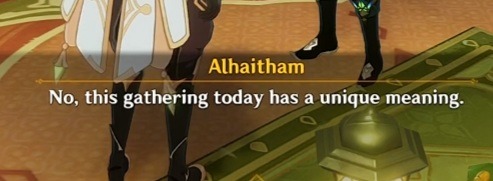



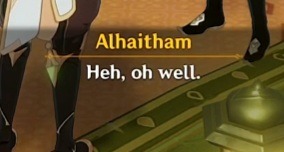
Which was always bothering me, because:
One: He suddenly becomes quite sentimental and talks about happiness, which is cool to see, but at the same time... He very rarely talks about subjective emotions. And what's more, he seems genuinely enjoying the thought of it. He isn't really the kind of person who gets his sense of satisfaction out of someone else's happiness (it's one of the things he parallels Kaveh in), so what's this all about?
Two: He extremely abruptly switches the topic to point out that he "seems to have taken both keys when he left the house" (tbh I thought that I accidentally clicked on him the second time and it's the new dialog, but no, it is all specifically a one long dialog).
Well well well. What do we have here.
When I first read these lines I decided that's it's just a weird writing without normal conversation flow. First Alhaitham is satisfied that he's plan worked and his daily life is safe, but says it through pointing out that other people are happy rather then explicitly stating that he's happy. Then he yaoi baiting us with "haha, harassing Kaveh is so much fun" and that's all there is to it.
But.
Now that we know more about Alhaitham's daily life during the archon quest, let's think about the keys some more.
He was able to take both keys because Kaveh was at home and his keys were there either. On his way out to meet us, Alhaitham saw Kaveh's keys on their usual place and took them as well, ultimately making Kaveh unable to leave the house. Which also means...
Kaveh will definitely be at home when Alhaitham returns after the feast.
So if we flip everything based on this logic, Alhaitham tells us: "This is a great evening. This gathering is special. People are finally happy. They feel happiness from the bottom of their hearts. And when I return home there will be someone waiting for".
Which is. So. PRECIOUS!.. Something clicked in my brain when I first realized this meaning and these lines are finally making a lot of sense!
It's the perfect final words for his little character journey in this quest. He protected the life he had and loved, everything and everyone were back to normal again and for him it is a true happiness felt from the bottom of his heart. Just precious.
Final words
Anyway, yes, that's why I believe that during the archon quest Alhaitham was actually constantly worrying about Kaveh at the back of his mind and maybe even feeling lonely, which resulted in his great boom of toxicity during their first on-screen dialog, but after some time he cooled down and slipped into his usual happy comfortable and not "nice and quiet" life again.
And fuck the sages for sending away our boy Kaveh (who actually knows a lot about desert since he works there often) and making our rescue-Nahida-group one competent person shorter.
Thanks for your time and tears, you, the person who read this!
#you can read it both as platonic or romantic#haikaveh#alhaitham#kaveh#kavehaitham#sumeru archon quest#character study#sort of?#my text
73 notes
·
View notes
Photo


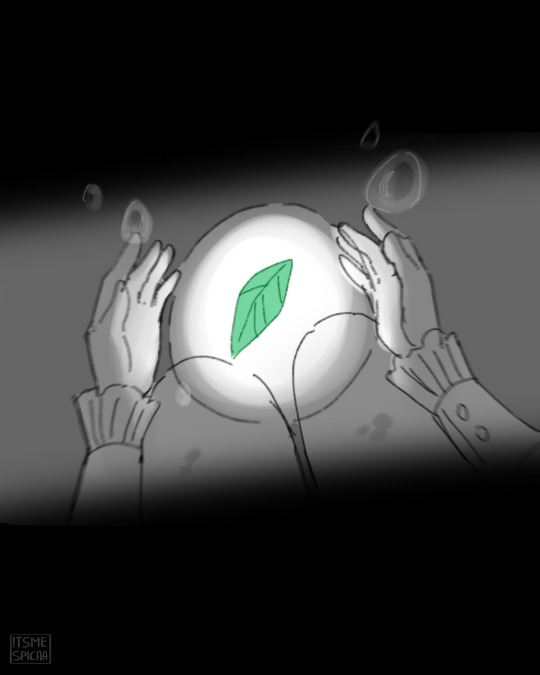
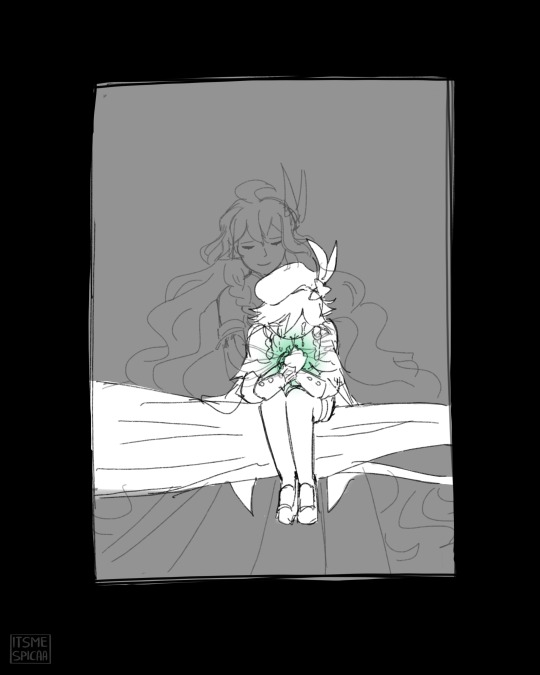

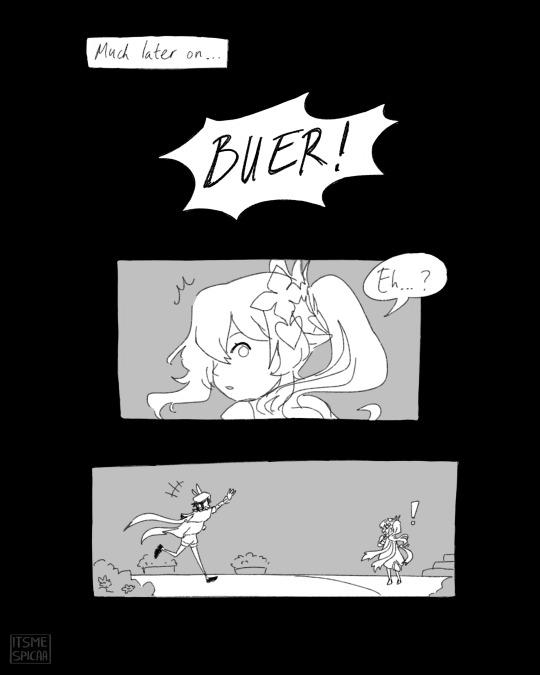
"Seeds of Stories, Brought by the Wind..." (part 2/2)
(part 1 here!)
⚠️ Contains Sumeru Archon Quest SPOILER !!!
Fun fact: Nahida’s voiceline ‘When it’s windy’ is: “The wind never blows in the Sanctuary of Surasthana...Oh, sorry. That's probably obvious to you.” I’m not crying what tHE FUC-
The fic continuation of the last page is below :D
------------
Venti shouted, waving and practically flying to her, “Buer!”
It seemed that Nahida had just escaped from a room of her people asking for her guidance and advice on what to do next with the Akademiya, from the way she was stunned at the unexpected call of her true name.
“Eh…?”
Without warning, he grasped her smaller hands in his as the wind sang and blew wildly around them, reflecting his unrepressed joy.
Venti laughed: “Ah…it’s been much too long!”
The Traveler ran to them before looking around, worried that others would be suspicious of the strange interaction of their archon and a strange bard from afar. But it seems most had to cover their eyes due to the strong wind just a while ago, and when they turned to Venti with a raised eyebrow, he just winked at them.
“This hardly seems like a proper place for a reunion between old friends–what say you, oh Dendro Archon?”
It seems Venti’s antics finally caught up with Nahida, who smiled back, albeit more subdued than the former. “Alright. Let’s go somewhere more private.”
~0~
In a flurry of white feathers and verdant leaves, they all reappeared inside the Sanctuary, the quiet ambience enveloping them gently like a cradle to a newborn babe.
“Mm, I haven’t been here in a very long time…” Venti sighed, eyes closed as though to listen even closer to the whispers behind the walls. When he opened them again, his eyes reflected the vibrant green like fireflies at night. “It feels familiar and yet…completely reborn.”
Unbeknownst to any of them, the Traveler’s eyes widened slightly at his remarks, lips shaking slightly with words they’ve agreed to never speak of.
“I guess…that’s what happens when you lose your memories,” Venti finally turned to Nahida with a forlorn smile, who had simply been observing him from beside the Traveler. The Dendro Archon clenched her hands together before walking up to him, meeting his gaze.
“...Barbatos,” Nahida started, “just as the wind blows the seeds of every story all across Teyvat, I’m sure the wind has told you of the story that was uncovered in Sumeru as well. I…I apologize for not greeting you in a manner befitting a fellow Archon, but I would like to extend my hand in friendship once more just as I did all those years ago.”
To her surprise, Barbatos simply giggled, his airy laughter jingling like bells. “I never knew how adorably anxious you felt when we first met~!”
Going down on his knees, he enveloped her gently like a mother bird brooding its younglings, catching the other archon off guard. “And our friendship never ended,” he said, his voice tapering off into a whisper, “no matter where you are in the endless river of time, you will always be a dear friend of mine, Buer.”
Nahida felt…comfort, familiar and oh so warm, an old memory that did not feel hers resurfacing from under the rubble, like a tiny sapling that willed itself to survive amidst the harsh and unforgiving nature imposed onto it.
After a second of hesitation, she returned the hug, burying her face in the awfully familiar scent of dandelions and wind, wanting to keep this feeling with her for eternity no matter what.
But alas, nothing lasts forever.
“I also heard from a certain Traveler,” Venti nodded at the quiet person watching them from a distance, “that the wind…never blows inside this tiny bird cage of yours. I see what you mean now.”
He stood up and summoned his lyre, walking to the middle of the platform, to the place she was trapped in for half a millennium. The place where the wind could not reach, where her tears and anxieties remained unseen and hidden from the world, her fate sealed by the people she was born to protect.
Strumming his lyre, he beamed at her: “Time to correct that!”
A gentle breeze flowed within her former cage, caressing her cheeks and the tips of her feet, bumping into her as though asking her to come play with them. Nahida’s eyes glimmered as silver white wings sprouted from Venti’s back, feathers floating in the air as he sang.
Ah…this voice…
Memories flooded her vision as snapshots of beautiful moments blurred past her eyes, untouched by the ravages of time. The tiny sapling grew larger and larger until it touched the sky above, to where they would return to. Singing together with the Aranara, the gathering of the first Seven, memories never lucid enough for her to see in detail but the emotions. Oh the emotions she experienced then…
(...She?)
Nahida did not realize the tears dripping onto the floor until she felt a warm hand on her shoulder, startling her to reality as she watched Venti glide down and extend a hand towards her, a gentle smile on his lips as he beckoned for her:
“Come sing with me? For old times’ sake.”
Ah…How could she refuse?
With a wide grin, she took his hand and sang.
No one but the Traveler and their floating companion would be the witness to this beautiful moment shared between the two neighboring archons, the two old friends separated by time and the earth itself.
One born of the thousands of branches of time, while the other sprouted from the purest branch of an ancient tree.
#genshin impact#venti#nahida#rukkhadevata#sumeru archon quest#archon quest spoiler#ALSO FUN FACT: the ost that played during the mond archon quest played during the nahida rescue scene :) im not crying you are AAAAAAAAAAAAA#I LOVE PAIN WOOOOOOOOOOO#QWQ#THEYRE FRIENDS YOUR HONOR LET THEM MEEEEEETTTT#AAAAAAAAAAAAAAAAAAAAAAAA#SOBS#im never getting over how neither venti nor zhongli remembers rukkhadevata i cant do this yall ;-;#also in case that wasnt obvious; venti slowed down time for a bit to say goodbye to rukkhadevata for the last time before he too forgets ;-;#being a creation of istaroth has both its perks and downsides and venti didnt know what this counted as hhh _(:"
309 notes
·
View notes
Text
There is so much contrast between the first meeting at this table and the last meeting at this table.
In the first meeting, Cyno refuses to take the seat next to Alhaitham, restlessly paces around the table, and avoids looking at anyone for the most part. He seems to be either uncomfortable making eye contact with everyone, or unsure how to do it without coming off as confrontational.
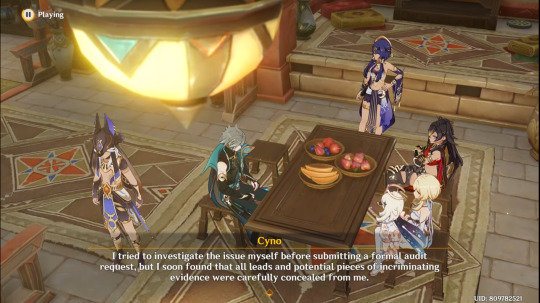
And Alhaitham is, notably, the only person who doesn't try to look at him. Not even when they're speaking to each other specifically.
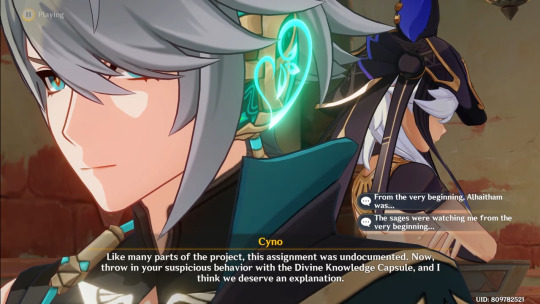

They seem to have agreed that making normal eye contact would be uncomfortable/tiring/pointless. I don't have a neurotypical explanation for this.
In the last meeting, Cyno is so much more comfortable. Cyno and Alhaitham voluntarily sit next to each other. The traveler was the last to arrive this time, so one of them could have taken the spot next to Dehya, but they didn't. And they look at each other! Fondly even. The way Alhaitham's gaze turns to Cyno as he's saying this line in particular... what? Did you have an emotion about him?
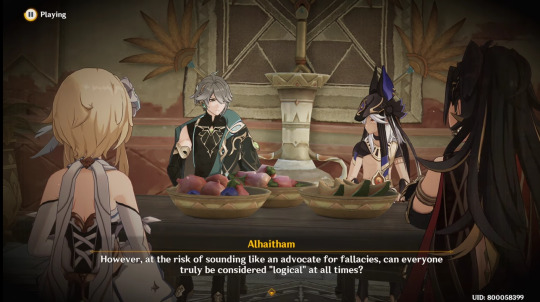
386 notes
·
View notes
Text
so we agree right? cytham is enemies to lovers
#genshin impact#genshin 3.1#not really even a spoiler#cytham#cyno#alhaitham#they're so interesting i am eating it up#anyway i love them both#both my husbands#sumeru#sumeru archon quest#truth in the pages of purana#king deshret and the three magi#dreams emptiness deception
349 notes
·
View notes
Text
entombed.
🏹 scaramouche x reader drabble
“it was said that the electro archon discarded him due to him crying upon his creation. he wasn’t worthy of housing a gnosis if he didn’t possess divine strength. if a god in the making dared to let tears fall from his eyes once again, was he worthy of this ascension?”
not proofread / written at 4am after i recently finished the sumeru story quest / so basically character and lore study / about when scara is “becoming” a god / previous situationship (?) / kind of suggestive but not explicit / angst ig / enjoy <3

you’d heard from him last before he fled inazuma with the electro archon’s gnosis. though the lack of goodbye pained you, you had since come to terms with the idea that it would be the last you’d see of him. that was, until you heard sumeru’s akademiya, in association with the fatui, was building a god.
your blood ran strikingly cold at the mention of it. the great balladeer was attempting to leave behind his past of being a discarded puppet and acquire the godly power that had once been his birthright. what his own mother had robbed him of; what he, in turn, took from her. you knew this about him, as before this sickening bitterness began to run through his veins and infiltrate his mind, he was the kunikuzushi you collected sakura petals and ate lavender melon with.
everything you had shared didn’t matter now. he was a traitor. the lasting impressions his kisses had left on your neck, trailing down to your collarbone; the ghost-like remnants of his fingertips brushing against your skin. the stories he whispered into your ears while resting his hands on the hilt of your hips, as if that slope was made for him to hold you. you missed scaramouche.
in these dry deserts and lush rainforests of sumeru, your dreams were not your own. the desires of your underlying subconscious weren’t something that could be indulged in during the comfort of the night; there was no longer solace to be found in the want of your imagination. it was taken from you; your mind leeched off of and stolen from in order to feed an undying desire for all the knowledge in the world. only to place it in the palm of his undeserving hands.
you had believed in him, once. you understood his pain. one that took root in the lightning bolts that came down in his past, in the strings that had long since been cut and allowed him to roam these lands himself. though you didn’t know what he saw in this time, you knew the hurt balladeer that came to you to seek out his own comfort; his own solace. and here he was, greedily taking that refuge from others.
this dream had been taken from you. one you woke up from with hot tears blooming in your eyes, staining your face, and you did not even know why you had been crying. somewhere else, deep in the akademiya, in a tangled mess of pulsating wires and mechanical whirring, that boy took in sumeru’s knowledge as if it was the very oxygen he breathed. and in that, he saw you.
he saw the dream your mind had harbored that night. they were flashes of white-hot feelings and energy, a flickering slideshow of memories that had since passed. moonlight illuminating a bare window, filling the shared bed with light. the feeling of goosebumps being raised wherever he trailed his hands over your skin, muscles flexing underneath his touch. he had shown you not just the stars, but the universe.
it was something sacred, of sorts. something sealed off and to be kept only by you two. they were unspoken promises shared by his lips pressing to yours, as if your lives coexisted in a mutualistic frenzy. every hushed whisper, every gasping breath, they were only yours to share. because, at your very core, you were his, and you were always searching for a way back to the home you dearly missed.
he couldn’t help but to share your consciousness. as your fingers delicately brushed over your burning skin, still shaken from your rude awakening, you saw the familiar purple glow as if it was right in front of you. you figured it was a hallucination; your mind was thinking up what you wanted to see so desperately. he only stared at you, and you were unsure what to make of the ghost-like figure lingering in front of you. and so you rested your head on your pillow and went back to sleep.
it was said that the electro archon discarded him due to him crying upon his creation. he wasn’t worthy of housing a gnosis if he didn’t possess divine strength. if a god in the making dared to let tears fall from his eyes once again, was he worthy of this ascension?
this was a life he had long since left behind now, accompanied by titles he had since relinquished. you were a thing of the distant past to him, and the electricity that existed between you had ceased. at once, it began to pour outside, lightning bolts raining down in harsh snaps, thunder rumbling through the earth as if the tectonic plates were shifting.
was this the raiden’s doing? or…
<3 M
#genshin impact#genshin#genshin impact angst#genshin x reader#genshin impact x reader#scaramouche#scaramouche x reader#kunikuzushi#the balladeer#kunikuzushi x reader#balladeer x reader#scaramouche angst#scaramouche character study#hurt/no comfort#electro archon#raiden shogun#raiden ei#sumeru archon quest#scaramouche brainrot
113 notes
·
View notes
Text

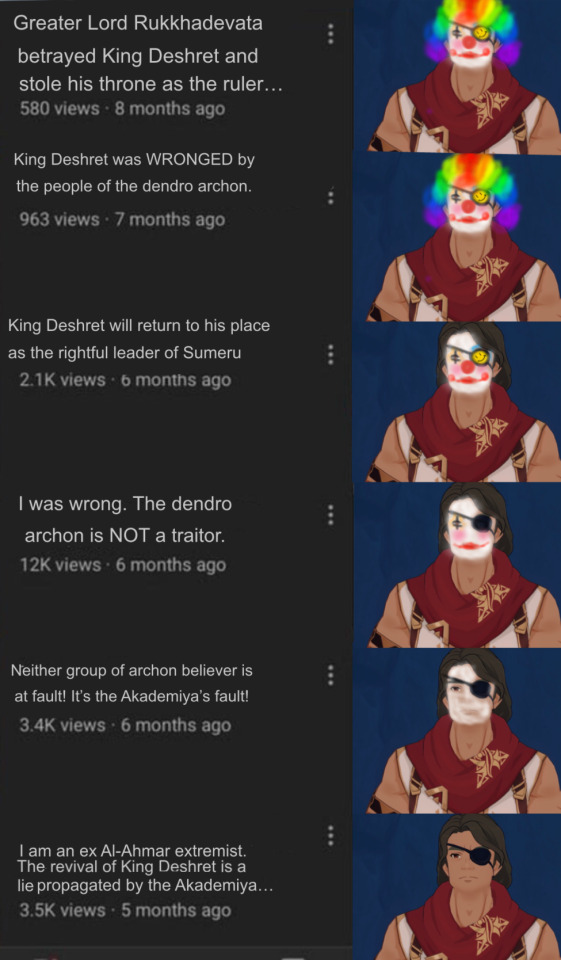
fr him
#genshin impact#shitpost#memes#meme#genshin impact meme#sumeru archon quest#Sumeru archon quest spoilers#Rahman#rahman Genshin impact#eremites#genshin impact eremites#King deshret#king Deshret lore#Sumeru lore
22 notes
·
View notes
Text
I saw a theory (more of an idea, really) on Reddit that Kaveh might become the next Grand Sage, and I just wanted to squeal about that for a hot minute.
(And for clarity cos I feel like it'll come up: Kaveh doesn't have any reliable leaks relating to his kit nor his rarity (whether he's a five star or four star), and even if he is a four star he could very well still be super important to Sumeru's chain of authority (see Ningguang and Kujou Sara if you're doubtful)).
Anyway, my squealing:
It actually makes a surprising amount of sense for Kaveh to become the Grand Sage based on quest info alone - Alhaitham says at the end of Act 5 of the archon quest that he "wouldn't be surprised if Kaveh was appointed as a sage":
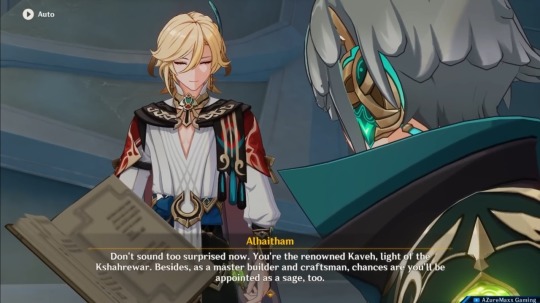
While his tone sounds sarcastic, Alhaitham is typically quite honest with his words. His deceits always come by omission, not by lying. Of course, Kaveh assumes Alhaitham is being mocking here, but then in Alhaitham's story quest Kaveh says himself that he should have been made Grand Sage over Alhaitham -
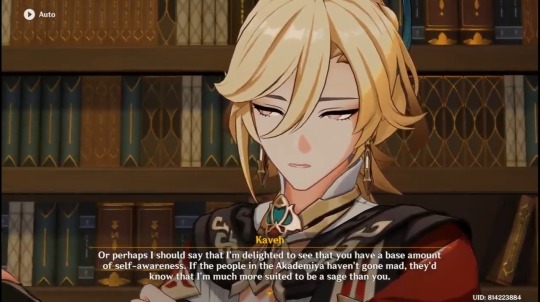
So we have examples in both of Kaveh's in game scenes that convey a desire (or, at the very least, a capacity) to be a Sage. These exchanges are rather comedic though, so I think we should take evidence from Nahida herself; specifically, her "About Kaveh" voiceline:
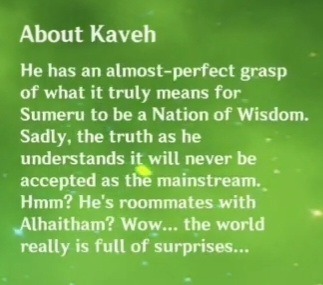
(sorry for the poor quality)
Nahida herself praises Kaveh's understanding of their Nation and of wisdom itself, whereas she admonishes Alhaitham's viewpoint in her corresponding voiceline about him. This implies that Nahida would choose Kaveh over Alhaitham as Grand Sage.
Lore wise we know that Kaveh is an accomplished graduate of the Ksharewar Darshan, widely known and well-liked. He built the Palace of Alcarazy(?) and the NPCs there sing his praises. While his interactions with Alhaitham are goofy, he can evidently keep up with him in debates and in Alhaitham's voicelines he says that Kaveh's intellect is equal to his own.
Also, there is a pattern in the game so far: each non-archon 'leader' or 'authority' has the vision matching their archon. Jean for Mondstadt, Ningguang for Liyue and Sara/Yae for Inazuma (depending on your perspective). It seemed that Alhaitham would fill this role in Sumeru, seeing as he's dendro and did take over as the Acting Grand Sage, similar to Jean's title. However, his time in that position is incredibly short-lived since he resigns at the end of his story quest (well, technically before it even starts). It is likely that "who will be the new Grand Sage?" will be an ongoing plot thread in Sumeru, much like "when will Varka return?" is in Mondstadt.
Since Kaveh is dendro, he would suit this pattern very well.
I also do just love the vibes of what it would mean for his character, and I think it would be very fun for Sumeru to be led by someone so wholeheartedly compassionate for everyone around them. Kaveh loves the arts and cares a lot about other people, so he matches Nahida's vision of Sumeru much better than Alhaitham does. Which isn't to say Alhaitham is cruel or uncaring, but that he is (as he says himself) not suited to the responsibility of leadership.
And, speaking of Alhaitham, the way this would develop their dynamic is actually rather funny. Technically Kaveh would become Alhaitham's boss, but everyone around them would be aware that Alhaitham saved the country and that Kaveh has only received the position because Alhaitham passed it over first. Can you imagine how frustrating that would be for Kaveh? Technically in charge, but with this information looming over everyone's heads?
Since Hoyo does like to keep a certain status quo, especially in voicelines, it's likely that Alhaitham and Kaveh will remain roommates. This still works even if Kaveh is promoted, with four possible explanations:
Kaveh's debt to Dori is so huge that he's financially screwed for life regardless of his salary
Kaveh is so bad with money that even once he's paid off his debt he still fails to save up for his own house
Because technically Alhaitham's house should also belong to him, Kaveh is stubborn and refuses to move out
Alhaitham and Kaveh reconcile/figure themselves out enough that they actually want to live together even if there's no financial incentive to
Also, I cannot overstate how amusing it would be for the Kavetham dynamic shift of Kaveh getting to fuck with Alhaitham a little as payback for all Alhaitham's trolling.
Anyways, this is a theory/hc that I really like, so I hope we don't get a mystery Sumeru character in 4.6 or something that we've never heard of before who gets to become Grand Sage.
#alhaitham#kaveh#genshin impact#al haitham#kavetham#sumeru archon quest#alhaitham story quest#acting grand sage#theory#headcanon#alhaiveh
450 notes
·
View notes
Text
[3.3]: On Dreams, the Abyss, Forbidden Knowledge, and Wish Fulfillment
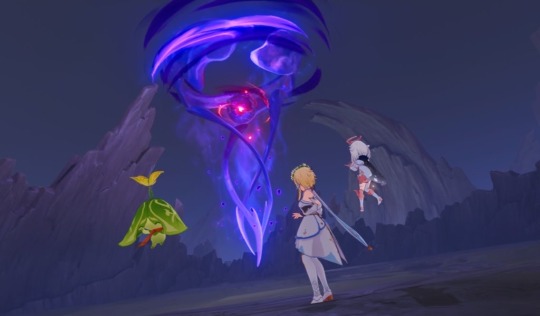
So basically I was reading for another theory about automatons and the uncanny in Genshin, but ended up with some separate-but-related ideas that grew legs and a tail and is now this post. Today I’d like to discuss how Freud’s psychoanalytic theory of dream interpretation provides a framework to help us understand what the Abyss is, what Irminsul edits do to reality, and what forbidden knowledge might be. If you are not caught up on the 3.3 Interlude Archon Quest (Inversion of Genesis), Nahida’s Story Quest, Aranyaka, or Perilous Trail, do not read any further!
(As a side note: I will be simplifying Freud, but I hope that in the process I am not butchering him. Corrections on how the information is presented and applied are welcome!)
Psychoanalysis 101 - On Freud’s Theory of Dream Interpretation
Though it may seem unrelated, in order to begin to understand Freud’s conception of dreams it is actually useful to start with his theory on the psychology of errors. This theory is more commonly known as the “Freudian slip,” the accidental voicing of an unconscious thought often (though not exclusively) through substituting one word for another.
Freud believed that errors occur when two different tendencies “collide” with one another in the process of communicating. The error is not a result of the interrupting tendency triumphing over the other, but is rather the compromise produced between the two tendencies in their collision. For example, I’m talking to someone I don’t particularly like and have to express some politeness to them, but my sentence comes out wrong and includes a more hostile word than I originally intended - the error betrays that my true feelings are not amiable toward this person, but the error in and of itself is not the true expression of my feelings, just a hint toward them.
Importantly, you do not have to be consciously aware of the thought or feeling that produces an error such as in the above example in order for the error to exist. We don’t even have to acknowledge that thought as our true feelings in order for it to serve as the error’s origin. As a psychoanalyst, this angle is crucial to Freud. The unconscious is the realm of the repressed, and to psychoanalysts it is where our most honest thoughts and feelings reside. I don’t have to acknowledge to myself that my feelings towards someone are less than positive for those negative feelings to still exist. I can even actively deny those feelings, suppressing them in favor of less critical thoughts. But I can’t just delete my feelings - they persist, festering in my unconscious mind.
Having understood this, we can approach Freud’s theory of dream interpretation with some important context and clarity. He theorized that dreams work very similarly to errors, in that the dream is the result of an interrupting stimulus or stimuli acting upon the body’s “tendency” to sleep, and the dream is a compromise between the two tendencies in order to protect sleep. Freud acknowledges the way that external stimuli such as noises manifest in a dream, but focuses his theory on the internal stimuli that act on the sleeping body in a hope to disturb sleep – namely, thoughts and feelings, most of which are repressed by our unconscious. Freud also acknowledges somatic stimuli as interrupting sleep, but does not elaborate on them in his theory of dreams.
Freud believed the manifest dream content, the images that you’re shown in a dream, are a result of the latent dream thought, the unconscious thought disturbing your sleep, being transformed by the dream-censor through a process known as the dream-work.
The dream-censor disguises the latent dream thought in the manifest dream content, distorting it’s true meaning to the point that is unrecognizable. At least, in dreams that do not fall under what Freud called infantile type dreams (and we’ll discuss this type in just a minute). So, the dream-censor protects the ego from the unconscious thought through distortion. In order to arrive at the true meaning of a dream, the dreamer must freely associate the manifest dream content with other things in order to decipher the distortion and identify the latent dream thought. With me so far?
Freud also thought there were different types of dreams, one of which is the infantile dream. These dreams have very little distortion between the latent dream thought and the manifest dream content, though distortion is still present. An example he gives is of a little girl who dreamt of sailing a boat on the lake - she had sailed with her family the previous day, but their time sailing ended before she would have liked. The latent dream thought behind her dream, then, was “I would like to sail on the lake,” transformed into “I am sailing on the lake” in the manifest dream content. Freud thought infantile dreams held key information about the nature of dreams in general, which he hypothesized was wish-fulfillment. He believed that wish-fulfillment was central to all kinds of dreams, even what he called anxiety dreams, but that this idea is most evident when examining simpler dreams with little distortion. In the case of anxiety dreams, he asserts that they cause an anxious feeling precisely because the wish underlying them is one that we reject and repress, but it is so strong that the dream-censor fails to censor it fully.
We’re nearly done here, but this last idea is very important. The dream-censor effectively rejects the wishes and thoughts dredged up from the unconscious again by transforming them in the dream-work into something unrecognizable. Freud then asks, well, why is it that these rejected wishes only express themselves at night? Freud hypothesizes that the mind’s censorship is strongest during the day, but at night the censorship is “suspended, or at least very much weakened” (229) in favor of sleep, allowing these wishes to express themselves at all.

Aru: They are what the Jibashiri call the Shades of Tokoyo. But bear in mind the principle that “to know sin is to be free of it.” Do not tell them that they are afterimages.
So, let’s summarize this:
Freud thought dreams are a compromise between continued sleep and stimuli that would otherwise disturb sleep.
He maintains that when the stimulus is mental, it is dredged from the unconscious and censored into illusions that obscure the original meaning of the thought to protect the ego and make the thought incomprehensible.
He also thought that behind this mental stimulus is a wish seeking fulfillment, which is partially accomplished through the dream.
However, the dream cannot truly resolve the wish. The thought, therefore, persists in the unconscious until it is worked through in the conscious life (like through talk therapy).
Rejected wishes express themselves at night because this is the time the censorship is weakest.
While Freud’s theory is far from watertight, and the following applications to Genshin will also not be 1:1, I hope this can be a useful tool in some cases for trying to understand some of the concepts discussed in the intro. Without further ado,
Theory #1: The “chaotic space” beneath the Chasm behaves like a dream.
Now, I very well could just refer to Paimon’s dialogue in Nahida’s story quest stating that “dreams are chaotic,” then refer to the repetition in Perilous Trail of the term “chaotic space” and call it a day, and frankly I think there’s sufficient supporting evidence in the rest of Nahida’s story quest and Aranyaka to render this an acceptable choice, but I also think it’s useful to review all of the ways the space beneath the Chasm does reflect a dream space according to Freud’s theory of dreams, if for no other reason than to extrapolate these findings to other quests.
From the minute that the Traveler, Paimon, Yelan, Yanfei, Itto, and Shinobu fall into the chaotic space, things are not quite right. They notice that their sense of time past differs significantly amongst each other and their bodies seem to be in a “suspended” state, not accumulating fatigue or hunger. What’s more, some of them report strange sightings - fissures that appear and disappear, items that vanish, people that vanish. Illusions. They even stumble upon a strange room after falling through a fissure that shows them an unpleasant or anxiety-inducing thought specific to them, one that they all would “wish to avoid.” What’s going on here?
“All the things that we wish to avoid.”
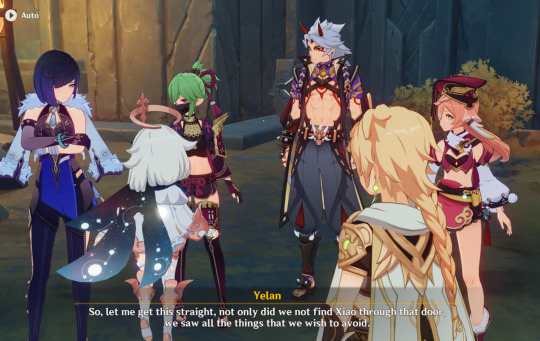
Let’s start with the strange room, and interpret the illusions as if they were dreams. We may not be convinced at this moment that these are in fact dreams, but let’s see what happens when we try fitting them to Freud’s theory. In particular, we’re looking for “manifest dream content,” which we will help translate into a “latent dream thought” with the help of the dreamer, and through this we should be able to identify some kind of “wish.”
Itto’s illusion is Inazumans throwing beans at him and berating him for his influence on their children. This illusion could represent a real memory of Itto’s - one of the NPC’s is named, after all - but he never identifies who these people are to him beyond their Inazuman heritage, so there is no way of knowing if it is an identical memory or not. Still, let’s apply some Freud here and interpret the scene, treating it as an anxiety dream due to Itto’s reaction to it: The manifest dream content, the Inazumans throwing beans at him, represents Itto’s desire to avoid the ire of humans. Indeed, he greatly fears it. The latent dream thought behind the manifest dream content, then, is Itto’s wish to befriend humans and live a carefree life. Despite this sincerity, he is often met with animosity from people other than the Arataki Gang and the children of Hanamizaka. Itto’s wish to befriend humans causes him fear to admit, even if that fear is unconscious, because the scene from the manifest dream content is what he is so often met with in real life.
Similarly, we have Shinobu’s illusion. Importantly, Shinobu only claims familiarity with the conversation her mother’s illusion is having with her, and not exactly with the scene itself. This is a hair-splitting point for me to make, but I hope if you’re not convinced now that after the next two examples it will seem more plausible.
Yanfei: Your mother wanted you to become a shrine maiden?
Kuki Shinobu: The whole reason I came to study in Liyue was because I didn't want to become a shrine maiden. My family never approved of my studies, so they wanted me to work in the Grand Narukami Shrine after I returned to Inazuma.
Paimon: From what we know about Lady Guuji, it seems being a shrine maiden is a pretty cushy job.
Kuki Shinobu: Think of it this way: Some cats can be domesticated and kept in the house, while other cats are meant to survive in the wild... As for me, I need complete freedom and space. Although I do admit that being a shrine maiden is a decent job, it's just not for me.
From this excerpt, I would guess that Shinobu’s wish and latent dream thought is as she says: she wants to live her life freely and pursue anything that interests her. The manifest dream content demonstrates the anxiety that her conviction in this wish causes her through the resistance she faces from her family members as a consequence.
Yanfei’s illusion is where things start to get interesting. She sees people having a civil dispute, something she often has to deal with in her profession as a lawyer:
Paimon: Who were they?
Yanfei: No one in particular, but it is a prime example of the many difficult civil cases that I've had trouble handling before.
Yelan: Hmm, so you mean you don't like handling disputes over petty matters?
Yanfei: Not exactly, what I mean is that I don't like working with people who cannot let go of trivial grievances, especially of the kind you saw just now. They start with good intentions, but end up making a big fuss...
She then states that her motivation in pursuing this profession is to help people solve problems, but that people like those in her illusion are difficult for her to comprehend. Her wish is to successfully navigate difficult legal terrain to help her clients, her anxiety is that she is not equipped to do so because she can’t understand everyone’s “complicated minds.” Put in more Freudian terms, the fact that Yanfei strongly wishes to solve people’s problems as a lawyer despite knowing she finds some minds particularly incomprehensible causes her some anxiety.
Finally, we have the Traveler’s illusion. It is nothing but the vast Abyss. The Abyss that took their twin away, who they are always searching for. We know intimately that their wish is to find them, and their anxiety is that they never will, that this journey of theirs is pointless - hence the twin’s lack of presence in the illusion.


Yanfei’s comment that her illusions were no one in particular also makes me suspect that the previous NPC’s identities are less important than the ideas and thoughts they are representing. The scenes are not the reenactment of a memory, but a distorted illustration of a unconscious thought. Where these illusions at times do not line up with Freud is that the dreamer’s wish is not repressed but is in fact something that the dreamer is actively pursuing in real life. If the wish is not repressed, perhaps the doubts and anxiety associated with them are. Regardless, both seek expression through the illusions, with varying amounts of distortion.
Are we at least receptive to the possibility that these illusions are more than just tricks the space is playing on the crew, that there are wishes underlying them that are specific to each person and draws from both the conscious and the unconscious? If so, I would like to propose that this room did not just show illusions of scenes specific to the people opening them, but dreams.
“Reading our minds.”
Now, let’s deal with the other illusions outside of the strange room. The chaotic space is demonstrably manipulative in how it interacts with each of them. While looking for Xiao and a way out, it projects an odd illusion of him and his voice through a fissure to lure the crew to the dream room. Yelan reports seeing illusions of catalysts specific to her clan and of people when she was there to find the truth about Boyang’s fate. Yanfei also notes that “the chaotic space” is really a misnomer, as it is really several spaces that constantly intersect with one another and can be directly influenced by their own mind’s wishes. They are not completely at the space’s mercy, in other words.
Remember how Freud thought that dreams were a vehicle for wish-fulfillment? It turns out that everyone who makes it to the deepest levels of the Chasm’s illusions also had a deeper purpose for being there: Xiao wished to find Bosacius, Yelan wished to learn the truth about what happened to Boyang during the Cataclysm, Yanfei wished to find the Fantastic Compass, and the Traveler is always wishing to find their twin.

Yelan: This is a long shot, but it may be our last chance…so, whose wish was it that summoned this device?
Traveler: Perhaps it was all of us.
In this deepest part of the space, all of these wishes are answered. While the space undoubtedly had an ulterior motive of trapping them further by using their wishes as lures, the facts remain the same - by stumbling into the last domain after Itto breaks another illusion along the cave’s walls, they’re able to make contact with several phantoms of the Fantastic Compass, allowing them to navigate to the correct time-spaces to get closer to what they all wished to find. I haven’t read too much on this topic, but my first thought is that this is similar to what it might feel like to have a lucid dream.
Yelan gets her answer about Boyang, Yanfei finds the Fantastic Compass, Xiao learns Bosacius’s fate, and the Traveler is cruelly tricked once again with a phantom of their twin in a time-space that resembles the Abyss. Though the space does effectively “fulfill” their wishes with the added direction of the compass, are the answers what they truly wanted? Did it give them peace, or did it serve to lower their spirits again?
Yelan: I went back to the domain again just now. Although I couldn't find a new route, it wasn't a completely fruitless trip.
Yelan: My clan has practiced magic for generations and has created some catalysts that only we know how to use.
Yelan: I recognized something like one of these catalysts in the domain. Unfortunately, it disappeared as soon as I approached it.
Traveler: Was it an illusion?
Yelan: I think so. But it's hard to distinguish between reality and illusion here. I can't be sure.
Yelan: Also... I am the only one out of all of us who could know what it would look like. To me, that confirms that this place really is reading our minds.
Yanfei: Just like with that door. It's like it's alive, and testing us.
Yelan: By reading our minds and showing us what we want, it creates the reality that we want to be true... Everything it does is either to get us to lower our guard or to wear us down.
Yelan: If that's the case, it can only have one goal: To trap us here until we die. What else could it be?
I would make only one amendment to Yelan’s comments here - the space is not just reading their minds, it is their minds. It is their shared dream. It projects illusions using everyone’s memories, unconscious wishes, and conscious thoughts. The illusions are a result of these thoughts interrupting the space’s influence. Their purpose is to draw the dreamers in further, luring them deeper into the space so it can continue its tendency to consume their souls.
Without speculating too much off the deep end, it is clear that the chaotic space traps souls and is capable of holding physical objects taken there, though those objects are no longer able to be taken out. We see this from the notes Boyang and the other Millelith soldiers left behind, as well as from the Fantastic Compass. Clearly, none of these items belonged to any of the people in the Traveler’s crew, so the space must continue to exist regardless of someone’s physical presence within it. I would speculate that the reason this is the case is because the chaotic space is sustained by the souls it consumes. Yes, I mean to say that the chaotic space is also the shared dream of all of the fallen soldiers, of Bosacius, and of Boyang. They are all still “there” in the space, wandering as lost souls, as Xiao implies of Bosacius during his fight with his illusion.
Escape from the Depths

Let’s wrap up this theory here, because we still have a lot of ground to cover. I’ll conclude with some remarks on the red specter-forms that try to prevent the team’s escape from the space at the end.
There is an achievement after the conclusion of this cutscene titled Layers of Fear, which I believe provides a hint at what these specters are supposed to be. If we at least partially accept that the chaotic space behaves like a dream, and that in order to conjure the images characteristic of manifest dream content the space would also need to have access to the dreamer’s unconscious in some way, then these specters are the raw embodied form of the fearful thoughts of everyone trying to escape (to say nothing of how they could also belong to the souls consumed in the space). They are trying to drag them back down into the depths, a symbol of the unconscious where repressed anxiety and fear fester. In the next couple of theories, I’ll make some guesses as to what this means on a broader scope.
Theory #2: The chaotic space shares characteristics with the Abyss, but is not quite the Abyss.
In the last theory, we briefly touch on the possibility that the chaotic space is a shared dream space, and that it is sustained by the souls it consumes. The next question would be, if this were true, then what comes first? The dream space or the soul? How did the space come to be? While I don’t have a definitive answer for that, I do have another rabbit hole we might jump down based on Katheryne’s dialogue in Requiem of the Echoing Depths, the last time that we saw Dainsleif. As she bids us farewell before heading to the Chasm, she recites the Adventurer’s Guild slogan before pausing at “abyssosque,” remarking that “this time, you truly are bound for the abyss.”
So, let’s pause. The Chasm was Liyue’s frontline against the abyssal monsters’ invasion from the Cataclysm. According to the legends, the monsters came “from the depths,” and the deepest part is outright referred to as the abyss in several instances in the Solar Relic of the Vermillion Hereafter set. So, why is there any need to make a distinction between the space and the abyss, or to be skeptical of equating them?
First, the space doesn’t really behave similarly to Dark Enkanomiya in the Three Realms Gateway Offering event, which was being polluted with void energy from the Void Realm (the Abyss in a fancier font). It certainly does try to take advantage of your fears, a tactic we saw an Abyss Herald try to use in Andrius’ corruption ceremony (though Abyss Heralds are of the Abyss Order, distinct from the Abyss, corruption affects anyone who comes into contact with the abyss).
Abyss Herald: You claim to be a guardian, yet your once-sharp claws have clearly dulled since your days of godly glory.
Abyss Herald: If you serve us, we can restore your divine powers you once held in the past.
Boreas: Lies... lies…
Paimon: Oh no... Is this the same thing they did to corrupt Dvalin's mind?
Time also functions differently in the chaotic space compared to on the surface, something we can also trace to the Abyss from Childe’s lore - he spent three months in the Abyss with Skirk, but only three days had passed on the surface. But, if the chaotic space was the Abyss, I am not sure why Yelan wouldn’t have commented on the space’s similarities to it sooner. The only time she mentions the abyss is in the deepest parts of the chaotic space, when the Fantastic Compass’s needles are pointed forward the farthest they can go and the Traveler sees an illusion of their twin that turns into a smaller Fantastic Compass. Yelan knows the Abyss well from her own past, so it’s weird that she didn’t mention anything until close to the very end in a specific place.
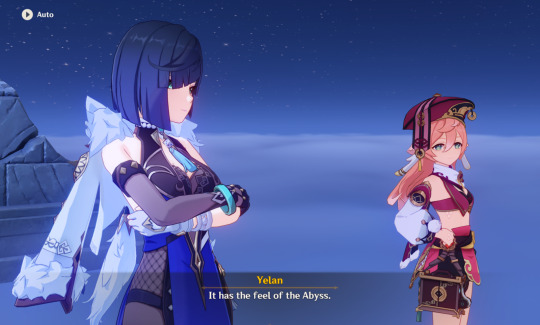
So, what about a middle ground? The space shares characteristics with the Abyss because it is a boundary, a liminal space, between the Human Realm and the Void Realm. A place where the two realms “interrupt” each other, much like the way dreams are a liminal space between the conscious and the unconscious, much like an “error” produced when two different tendencies collide.
Theory #3: The spaces below the earth, including the Abyss, are this world’s “realm of the repressed.”

The Thing Calling Itself “Enjou”: You mean, why wouldn’t I, right? I’m a creature writhing in the Abyss, and you’re a mortal walking in the sun.
This mini-theory definitely has its issues from the get-go, but let’s take a look at where this does ring true and then decide for ourselves how much weight this claim really holds. We’re also going to stretch the meaning of “repressed” here to deal with more than just unconscious feelings, but also beings and structures. Ultimately, we’ll see there’s not as big of a difference as imagined between these things and repressed feelings.
“Yet buried in the depths of this world lies smoldering remains…”
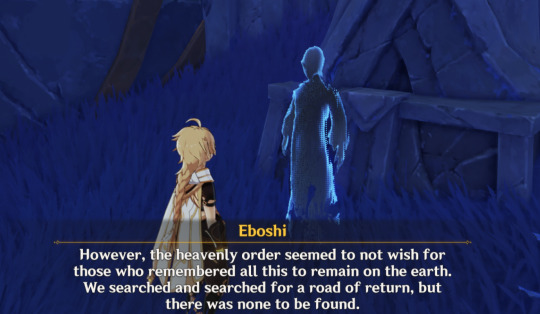
Eboshi: However, the heavenly order seemed to not wish for those who remembered all this to remain on earth. We searched and searched for a road of return, but there was none to be found.
In the beginning, the Primordial One vanquished the Seven Sovereigns and banished the Vishap race to the depths so that it could create a world suitable for its creation, humans.
Later, a second divine throne would descend to Teyvat and war with the Primordial One, who dropped the celestial nails to stabilize the “delusions and breakthroughs” arising in the mortal realm due to the “illusions” brought forth by the invaders.
In laying waste to the mortal realm, the ancestors of Byakuyakoku fell into a space below the earth and were banished from returning. There they met hostile creatures, the “Dragonheirs of the Depths,” who had lived in darkness since their defeat during the mortal realm’s creation. The two struggled against each other until the construction of the Dainichi Mikoshi and its artificial sun.

Eboshi: Due to the phenomenon known as Sinshades, the “past,” “history,” and “truth” of Enkanomiya would endure even if left to their own devices. As such, great effort was expended, not that we might remember, but that we might “forget.” Lady Sangonomiya was of this view.
Another such civilization’s ruins can be found deep within the Chasm, the nameless upside down city, but still more vanquished civilizations can be found in these spaces below the earth: the mural civilization of Tsurumi Island, the Ruins of Dahri (a Khaneri’ahn ruin), and the list goes on. Of those listed here, all were privy to truths of the skies that the Heavenly Throne sought to conceal and suppress. All of them had something to do with forbidden knowledge contamination events.
To return to the topic of Vishaps, the “return of the repressed” is also illustrated by a particular progression in 1.x patches with the Geovishaps and the Primo Geovishap. Prior to version 1.3, the Geovishap overworld enemy did not exist. There were only Geovishap hatchlings, which also had a slightly different appearance before 1.3.
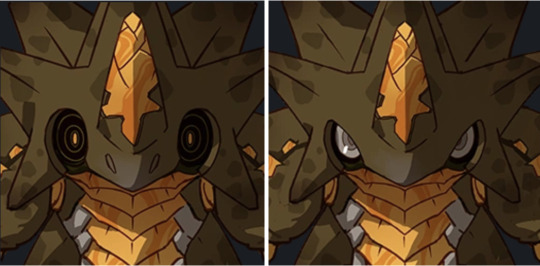
Pre-1.3 (left) and current (right). Notice the major change that occurred was in the eyes. The one on the left may be a newly resurfaced vishap hatchling with eyes still designed for below surface light levels, while the right one has adjusted to the change in light.
From the Geovishap archive:
It is said that after many years have passed, Geovishap Hatchlings will shed the armor that originally protected them and become Geovishaps. However these two and the older, greater Primo Geovishaps have spent many years hibernating under the mountains and have only emerged and become active in recent times. As such, none can personally attest to have witnessed or recorded such a thing in person.
And the Primo Geovishap archive entry:
Folktales hold that after the great "draconic calamity" that led to the ruination of Tianqiu Valley, the overlord of the Geovishaps and Primo Geovishaps was imprisoned deep beneath the earth, and so too did they burrow into deep and unseen places, awaiting their chance to rise once more…
This description is referring to Azhdaha’s imprisonment beneath the Dragon-Queller tree. Azhdaha debuted as a weekly boss in version 1.5, two patches after these Geovishap enemies were released and changes were made to the hatchlings’ appearance. Azhdaha’s own circumstances are no exception to this theme of recursion either - Morax found him beneath the mountains, befriending him for some time before having to seal him away underground once more. In version 1.5, he returns once more to break the seal on his tree and rise to the surface again. Azhdaha is at once two things: he is his own suppressed rage at the ley lines’ exploitation, and he is symbolically the repressed pain Morax endured in sealing his own friend. This will hardly be the last time they will suffer this pain, Zhongli knows. The repressed will return again. Hoyoverse demonstrated this phenomenon through their patch release schedule in a way I would wager was quite intentional, to gesture towards the “feelings” that were slowly bubbling back to the surface.
This is just a smattering of examples in a long list of cyclical recurrences, but I’ve gone on long enough. The point is that, with the notable exception of Sal Vindagnyr, the things this world suppresses are often found beneath its surface. They are things that this world would prefer to forget, something unpleasant that it would rather avoid.
Theory #4: Dreams, as liminal spaces between the conscious and unconscious, are a frontline for delusion and corruption.
Here I want to further explore the implications of a chaotic space like that beneath the Chasm behaving like a dream space, and that space’s behavior sharing characteristics with the abyss. To do this, we need to take another look at wish-fulfillment in dreams, delusions, and corruption. Here we have to fully embrace the analogy of the surface as the conscious mind and the Abyss as the unconscious mind to make necessary progress.
Seeds of Delusion
"We share the same goal, you, your Tsaritsa, and I."
"Cleanse the sources of distortion in this world: short-sighted, ignorant gods and the darkness and corruption of the Abyss." –Stainless Bloom, Pale Flame
Nahida’s first story quest is crucial to understanding the significance of dreams as sites for repressed wishes to be expressed.
Take the humorous first dream question Paimon is asked at the dream event. Ata finds his daily life difficult, so he wants his dreams to be a space of leisure where he can reliably “become” a Slime as relief. Paimon details every time she has dreamed of the same thing, but every dream ends the same way: tragically. This lays the groundwork for the rest of the quest quite nicely.
Each dreamer has an unfulfilled wish that causes them great sorrow, and that can never be fulfilled in real life again. Their dreams are the only place these wishes can be fulfilled, so they retreat into the dream world where the illusions of the manifest dream content can comfort them through pain. This is a prime example of how wishes can become obsessions, and how obsessions feed delusions. This is what it means to “become” a monster.
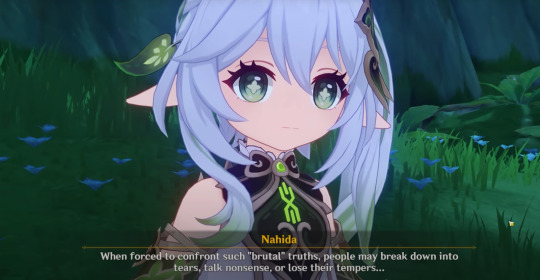
Nahida: When forced to confront such “brutal” truths, people may break down into tears, talk nonsense, or lose their tempers…
But this can only end in tragedy. Because dreams, ultimately, are illusions, and fulfilling a wish in a dream is not the same as fulfilling it in real life. Underneath the manifest dream content of all those who wish to escape reality is a latent dream thought that causes the dreamer terror. For Ilman, it is his wish to be with his wife and the repressed terror of never being able to do so again. Once the mantle of the dream-work from Beynuni (who functions as the dream-censor here) was pulled back and the dream collapsed, these anxious wishes all took the form of monsters - riftwolves, lawachurls, geovishaps.
Ata: I guess I just want to experience something different. My everyday life is nothing but the same…The sky is right above me, and the ocean just over the horizon, yet I remain caged in a life of monotony.
More than this, the underlying wish reveals something far more sinister in these dreamers, and that is a dissatisfaction with reality. It is this dissatisfaction, the horror of reality that welcomes delusion and Abyssal influence in the mind. Once it has taken root, “forgetting” becomes much more difficult. By blurring the lines between dreams and reality, the dreamers also introduced monsters near the site of their delusion in the real world. Maybe this is one of the consequences of trying to reject the truth?
The Forest Will Remember
Traveler: Do we need to enter the dream of the Vasara Tree this time too?
Arama: Yes. We must erase all traces of Marana's influence.
While dreams are not the only place where anxious thoughts can bloom into delusions and obsessions, they remain a key site for the beginnings of delusion and also for the forgetting of delusion. This is crucial to Aranyaka, which deals in memories, dreams, and the repressed trauma of lost innocence.
In order to save Rana from the influence of Marana’s Avatar, we have to help the Aranara save the forest from its influence as well. Marana is the memory of death in all things, reborn each time it resurfaces in the conscious mind.

Araja: The forest didn’t know death, until a day came when the trees realized that withered flowers and dead animals covered the earth.
Araja: On the same day, the earth remembered the dark, poisonous blood it had once devoured, or was about to devour. The rivers thought of the descent of the sun, evaporating all water and leaving a red world behind.
Araja: They realized that all things would meet their end, and so, Marana was born. It is the name of death, and those who know it shall die.
Araja: Marana urges everything towards death. As for the tall, dark, and warped beings, they are the avatars chosen by Marana, the heralds of death.
Marana’s influence spreads in Sumeru through Withering Zones as a consequence of forbidden knowledge polluting Irminsul. Tighnari notes early on in the Archon Quest that each eradication has a shorter latent period between resurgences. This is further reflected in Aranyaka by the many dreams we enter to “erase all traces” of Marana’s influence, because taking care of the Withering Zones outside of these affected plants is not enough to get rid of it.
Arama: Alright, Marana's influence should be right inside. If left unattended, it will soon turn the dream into a horrifying nightmare.
Arama: If we take care of the baddies inside, the Vasara Tree will become healthy again and thank us with a Vasoma Fruit.
Marana’s influence in the Vasara Tree takes the shape of fungi, perhaps in the Traveler’s dreams it takes the shape of an Abyss Herald. By eradicating its shadow in the Vasara Trees’ dreams, we help the Vasara Tree “forget” Marana so that it can produce a Vasoma Fruit with memories and dreams that are free of it.
Inherent to Araja’s definition of Marana is the return of the repressed. When the forest learns of death, it remembers “the dark, poisonous blood it had once devoured, or was about to devour.” The memory of Marana resurfaces, thus Marana is born again. Once it is repressed through the process of “forgetting,” the cycle starts over. This is not the first time that the forest learned of death, and it may not even be the second time. The source of the forbidden knowledge pollution event was King Deshret, after all. Didn’t that disaster occur before the Cataclysm? Oops, I forgot the initial pollution seemed to only affect the desert. Ignore this point.
But wait, Tillandsia! If you complete Aranyaka after completing the Archon Quest, the dialogue suggests even repressed memories can’t return anymore once they’re removed from Irminsul!
Arama: Yes. May we never meet again, Marana. Many tiny Marana remain in the forest, but we've defeated the greatest one.
Arama: I can sense that all memories about Marana in Sarva have been completely erased. In this case, even the memory and fear of "death" that dwells in all things cannot bring it back ever again.
Despite the temptation to bow to Arama’s words, we know this isn’t completely true. We’ll explore those loopholes briefly in the next theory…
Theory #5: Irminsul Edits as Dream Censorship.
“The tale of the moon goes like this: this story came from a very ancient dream, one that was hidden in a Nilotpala Lotus.” –Moonpiercer
Now, this post doesn’t cover even one tenth of the material in this game that deals with the concept of dreams. If I tried to address every single thing, we’d be here until sunrise and still going on tangents. However, I want to go down one more rabbit hole before calling it a day and moving on to the follow-up of this post.
You’ve probably noticed that many of the early dreams we considered did not suffer from heavy amounts of censorship from the dream-censor. The distortion between the latent dream thought and manifest dream content was minimal, allowing the meaning of the dream to be interpreted rather easily by myself, and in some cases by the dreamers themselves.
But we’re not free of the idea of the dream-censor yet. Its job is to mitigate the expression of the repressed thought in the dream, distorting it to the point that its original meaning is incomprehensible without dream interpretation techniques.
Well, the two don’t work quite the same way, but I couldn’t help but notice the similarities between what editing Irminsul does to reality and how the dream-censor distorts unconscious meaning. Irminsul contains a record of everything that has ever happened in Teyvat, with the exception of anything that originated outside of Teyvat such as a Descender. Nahida is an “avatar of Irminsul'' and has a deeper connection to it, having originated from its unsullied branches. What’s more, we know that Nahida has the power of dreams, a formidable ability in Teyvat that even the Fatui have their eyes on. Given her origins, could this ability also be an extension of Irminsul’s power?
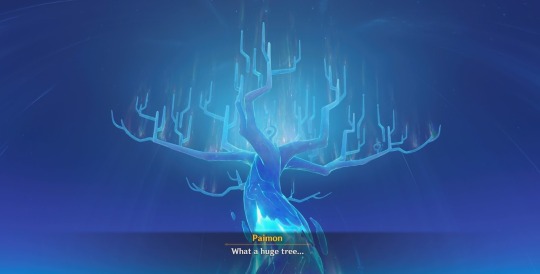
At the end of the Sumeru Archon Quest and in the Interlude Quest, two major edits are made to Irminsul’s records: Greater Lord Rukkhadevata’s name is erased, and Wanderer’s identities “Kabukimono” and “Balladeer” are erased. While these edits had severe consequences for the written and recalled records of the world, spanning from books to quest dialogue to artifact sets to domain descriptions to even character voice lines, we know from Inversion of Genesis that Irminsul deletions do not split any timelines or actually change the events of the past, but merely how they are remembered. Those who died in the past before the deletion still died untimely deaths, those whose lives depend on the consequences of edited events are still alive. Rather than removing information completely, I wonder if a better analogy is that Irminsul introduces distortion into everyone’s unconscious.
No, seriously. Seriously think about what Nahida did to save Wanderer’s past from the deletion. She hid his past in an allegory, and by interpreting that allegory she was able to remember his past, including all of the gaps left in between. It wasn’t a matter of reteaching Nahida and Paimon what the Traveler already knew, they couldn’t comprehend it that way. It was about properly recalling the information by associating each element of the story with something else. Just like a dream. She created her own form of distortion, one that could be more readily understood. Perhaps nonsensical on the surface, there is a hidden truth beneath it. If the analogy holds true, we can locate Irminsul and the Ley Lines in the boundary between the conscious and the unconscious.
The truth is not deleted, and the past is not changed. It is just being repressed.
Conclusion: Nothing Under the Sun is Truly New
Nahida: But in this dream, you showed them only the most comfortable and soothing things. This entire world has been built on a foundation of buried and unseen pain.
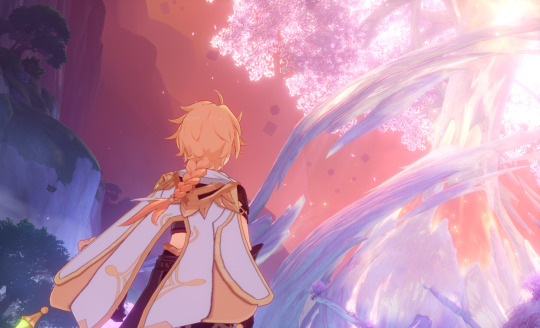
We’ve explored this idea of how unconscious, repressed thoughts recur through dreams by using Freud’s theory of dream interpretation as a framework, and we examined how this framework shows up in Genshin’s worldbuilding (and where it diverges). We’ve shown how becoming obsessed with these repressed thoughts can occur through delusion, and that delusion can take root in dream spaces. We’ve also revisited the ideas presented in Aranyaka about Marana, also known as The Withering, which exists and recurs because of forbidden knowledge from the Abyss that contaminated Irminsul.
With this, I’ll propose an imperfect analogy: the Abyss, symbolic of the unconscious and realm of the repressed, contains forbidden knowledge about the world at its deepest point. Though Greater Lord Rukkhadevata tells us that forbidden knowledge “doesn’t belong to this world,” that it comes from the very bottom of the Abyss, I am skeptical that this is really the full story:
Nahida: So what exactly is... forbidden knowledge?
Greater Lord Rukkhadevata: It's a kind of knowledge that doesn't belong to this world, and a form of "truth" that can't be understood.
Greater Lord Rukkhadevata: The world is constantly rejecting it, leading to all kinds of bad phenomena.
Greater Lord Rukkhadevata: If we allow forbidden knowledge to pollute Irminsul, I'm afraid the entirety of Teyvat could fall apart.
I cannot deny the way Greater Lord Rukkhadevata’s description of forbidden knowledge resembles the psychoanalytic concept of a repressed thought. Note that from Rukkhadevata’s dialogue, the problems that arise from forbidden knowledge seem to be a result of the rejection rather than the knowledge itself. Why is this “truth” being rejected? What makes it unable to be understood? Is this imagined destruction of Teyvat comparable to something like ego death, the destruction of self-identity?
Rather than coming from beyond this world, forbidden knowledge is, I think, more likely to be something that the world has forgotten belongs to it, “something long known and at once familiar,” that has become strange and incomprehensible through repression and distortion. It is something the world is in a cycle of remembering and forgetting in disaster after major disaster as the repressed returns once more. Dreams are crucial sites for its return.
What may be interesting to consider with this analogy is that if forbidden knowledge is indeed a kind of repressed thought that the world has “forgotten,” its recursion should tell us that it wishes to be expressed, and that it is seeking fulfillment in the world’s “conscious” mind. If forbidden knowledge was the world’s repressed wish, what would that mean? Hell, what would the wish even be?
Writing this kinda made me feel like how I felt while reading Freud, so if not everything makes sense or agrees with each other I sincerely apologize and hope there are at least a few ideas here that feel useful, even if just for this moment. Thank you for reading <3.
Sources:
All information regarding Freud’s theory of dream interpretation comes from A General Introduction to Psychoanalysis, primarily lectures 6-8 and 13-14. You may read it online for free at Project Gutenberg.
#genshin impact#genshin impact lore#genshin lore#nahida#genshin theory#sumeru lore#sumeru archon quest#aranyaka#perilous trail#theory#enkanomiya#azhdaha#irminsul#ley lines#don't worry I don't use any weird freudian stuff#he can keep all of that
213 notes
·
View notes
Text
*sigh*... Furina.

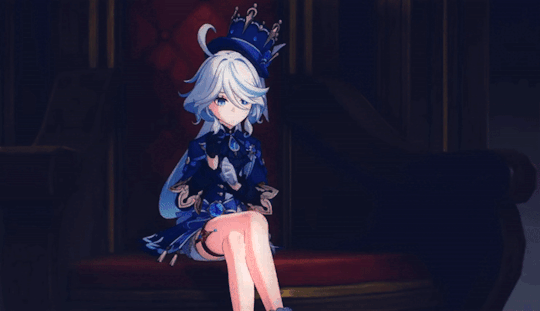
23 notes
·
View notes